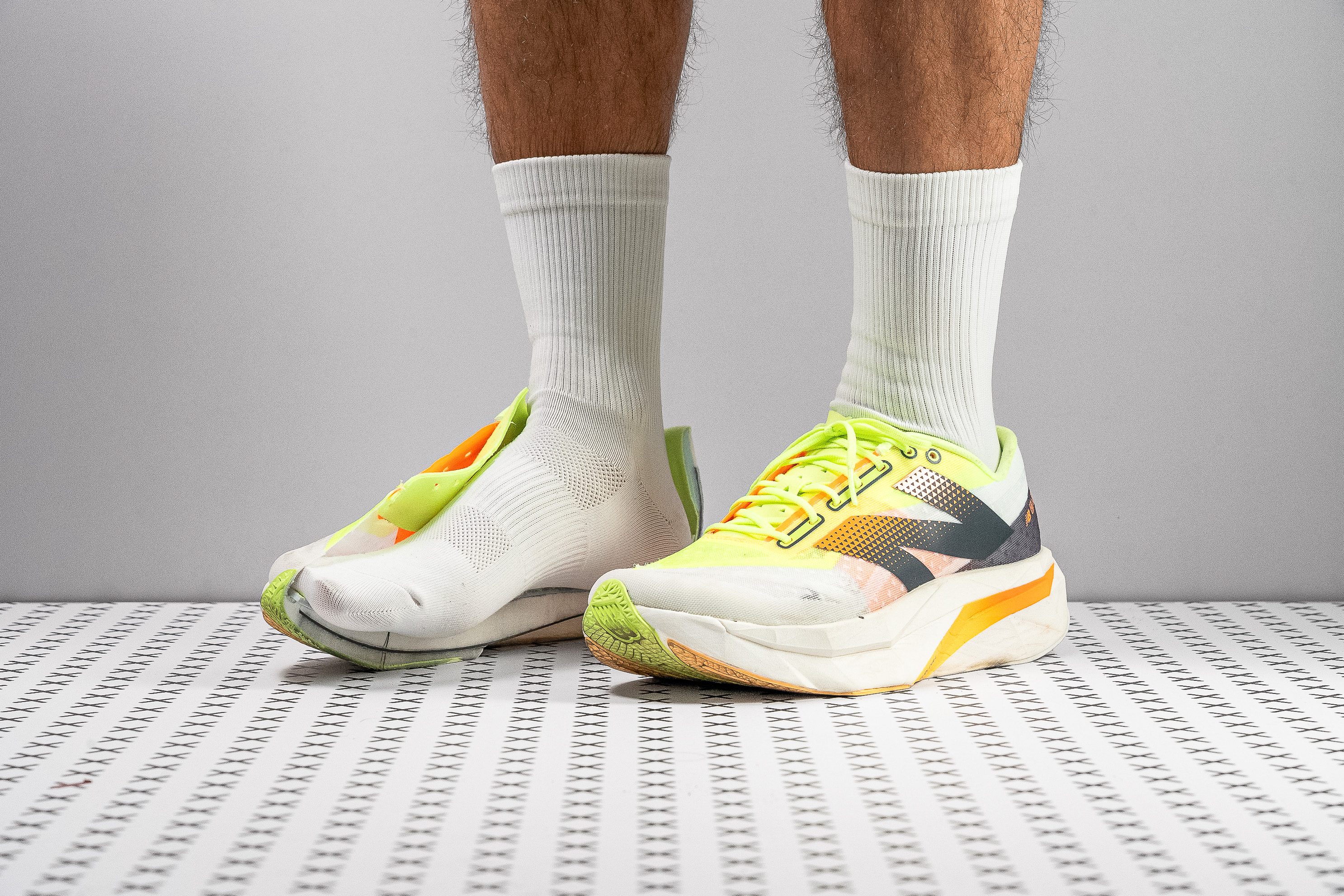Our verdict
- Top pick in best New Balance running shoes (2024)
Pros
- Incredibly comfortable ride
- Ideal for fast-paced long runs
- Finally features a PEBA midsole
- Marathon-ready performance
- Exceptional leg-saving cushioning
- Premium upper material
- Amazing for forefoot strikers
- Roomy toebox in a supershoe!
Cons
- Needs to lose weight
- Subpar tongue
- Feels bottom-heavy
Audience verdict
- Top 6% most popular running shoes
Comparison
The most similar running shoes compared
+ + Add a shoe | |||||
|---|---|---|---|---|---|
| Audience score | 88 Great! | 88 Great! | 92 Superb! | 88 Great! | |
| Price | £260 | £230 | £260 | £285 | |
| Pace | Competition | Competition | Competition | Competition | |
| Shock absorption | High | High | High | High | |
| Energy return | High | High | High | High | |
| Traction | High | High | High | Moderate | |
| Arch support | Neutral | Neutral | Neutral | Neutral | |
| Weight lab Weight brand | 8.2 oz / 232g 8.1 oz / 230g | 7.8 oz / 220g 7.7 oz / 218g | 7 oz / 198g 7.5 oz / 213g | 7.1 oz / 201g 7 oz / 198g | |
| Lightweight | ✓ | ✓ | ✓ | ✓ | |
| Drop lab Drop brand | 9.3 mm 4.0 mm | 9.5 mm 8.0 mm | 10.7 mm 8.0 mm | 8.5 mm 8.0 mm | |
| Strike pattern | HeelMid/forefoot | HeelMid/forefoot | Heel | HeelMid/forefoot | |
| Size | Half size small | True to size | True to size | Slightly small | |
| Midsole softness | Soft | Balanced | Soft | Soft | |
| Difference in midsole softness in cold | Small | Small | Small | Small | |
| Toebox durability | Decent | Good | Bad | Bad | |
| Heel padding durability | Decent | Good | Decent | Good | |
| Outsole durability | Good | Good | Decent | Bad | |
| Breathability | Moderate | Breathable | Moderate | Breathable | |
| Width / fit | Medium | Medium | Medium | Medium | |
| Toebox width | Wide | Medium | Medium | Medium | |
| Stiffness | Stiff | Stiff | Moderate | Stiff | |
| Torsional rigidity | Stiff | Stiff | Stiff | Stiff | |
| Heel counter stiffness | Flexible | Flexible | Flexible | Flexible | |
| Plate | Carbon plate | Carbon plate | Carbon plate | Carbon plate | |
| Rocker | ✓ | ✓ | ✓ | ✓ | |
| Heel lab Heel brand | 38.2 mm 40.0 mm | 38.1 mm 40.0 mm | 39.3 mm 40.0 mm | 38.1 mm 40.0 mm | |
| Forefoot lab Forefoot brand | 28.9 mm 36.0 mm | 28.6 mm 32.0 mm | 28.6 mm 32.0 mm | 29.6 mm 32.0 mm | |
| Widths available | NormalWide | Normal | NormalWide | Normal | |
| Orthotic friendly | ✓ | ✓ | ✓ | ✗ | |
| Season | All seasons | SummerAll seasons | All seasons | SummerAll seasons | |
| Removable insole | ✓ | ✓ | ✓ | ✗ | |
| Ranking | #248 Top 37% | #139 Top 37% | #11 Top 3% | #133 Top 35% | |
| Popularity | #37 Top 6% | #42 Top 11% | #33 Top 9% | #23 Top 7% |
Who should buy
After thorough lab testing, we believe the New Balance Elite v4 is a standout choice for:
- Runners seeking a super shoe with a plush, cloud-like ride, unconcerned by its slightly heavier build.
- Marathon enthusiasts with a higher budget desiring a carbon-plated shoe with world-class energy return for long runs and races.
- Loyal fans of the New Balance Elite series, finally rewarded with the long-awaited Pebax midsole.
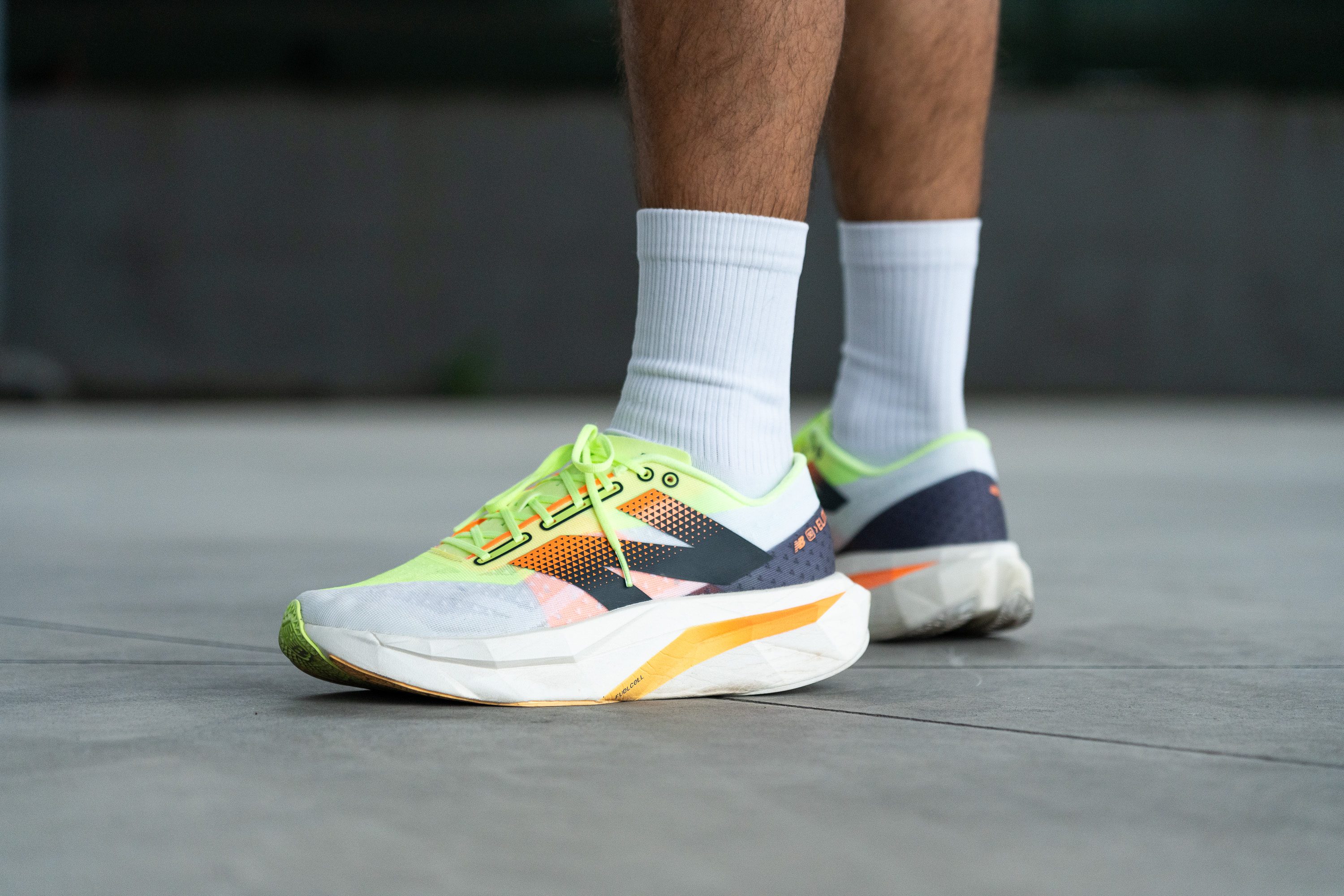
Who should NOT buy
While New Balance's Elite v4 brings amazing features to the table, we've concluded it doesn't quite hit the mark for those seeking peak performance in super shoes. For runners prioritising raw speed, alternatives like the Nike Alphafly 3 or the Adidas Adizero Adios Pro 3, which are still below the 40-mm stack height limit, might be more appealing.
We also noticed the SC Elite v4 offers a fantastic experience at marathon paces, but it might not be the best fit for the explosive ride needed in shorter 5K or 10K races. For those events, we recommend the Nike Vaporfly 3 or the Hoka Rocket X 2, both featuring a super-stiff carbon plate in a lighter build.
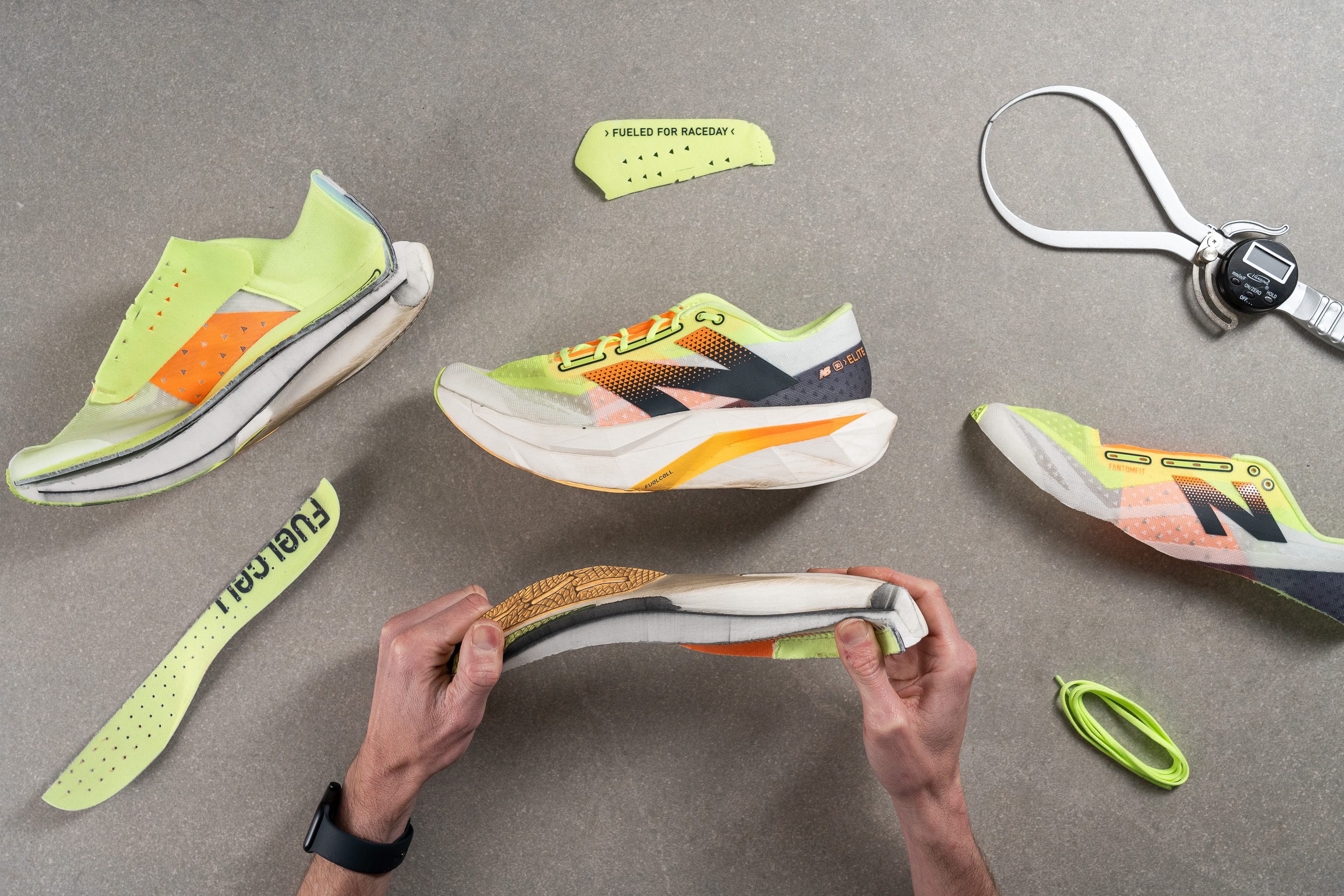
Cushioning
Shock absorption
With a midsole design that nearly maxes out the 40 mm World Athletics limit, we expected strong shock absorption. After testing the Elite v4 on the run, it was clear this shoe had marathon-ready cushioning.
Back in the lab, we measured 146 SA in the heel, well above average and right in line with top-tier competitors. The forefoot is a bit less cushy at 114 SA, but still good enough for any distance.
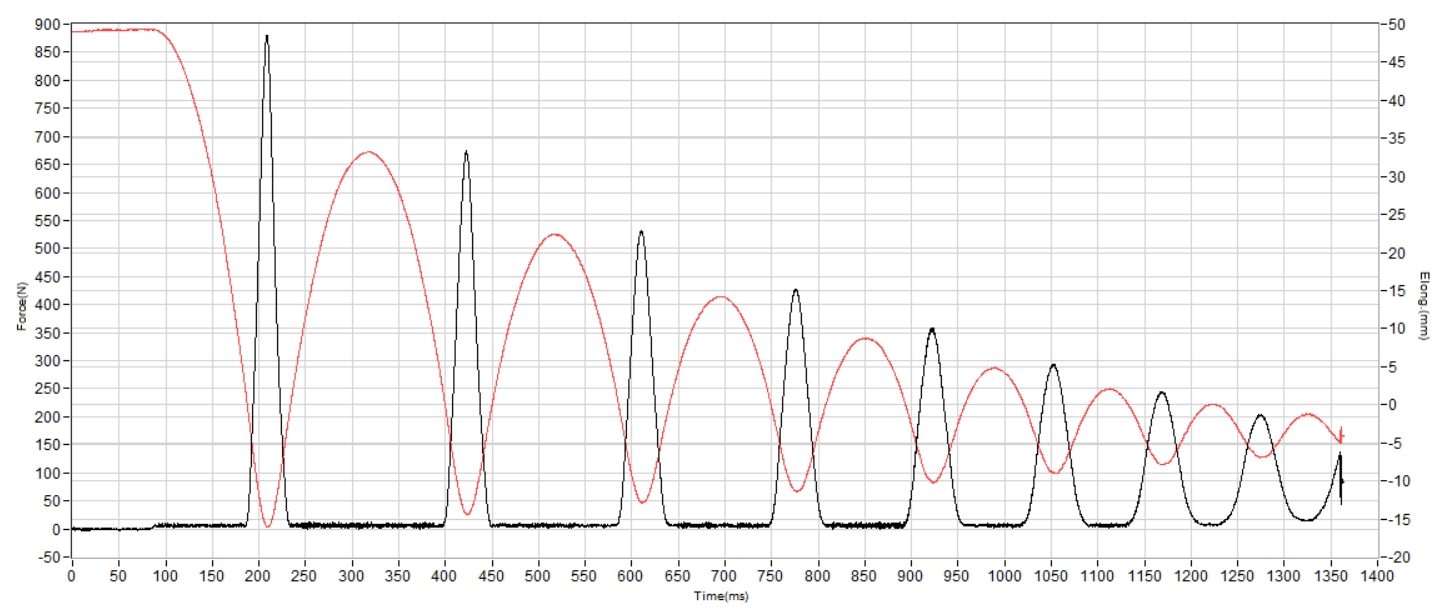
| FuelCell SuperComp Elite v4 | 146 SA |
| Average | 130 SA |
Energy return
After falling clearly behind the top-tier super shoes, New Balance is back with a 100% PEBA midsole that delivers world-class performance... and we confirmed it in our lab. In fact, only a few super shoes have crossed the 75% mark in our testing, and this is one of them!
With 77.3% energy return in the heel, this shoe cements itself as a performance beast. The forefoot came in at 72.7%—still fantastic—though this gap supports our belief that it’s one of the best options for heel strikers and beginners alike.
| FuelCell SuperComp Elite v4 | 77.3% |
| Average | 58.6% |
Heel stack
While the shoe might appear towering at first sight, it's not as elevated as it seems. New Balance incorporated hefty sidewalls for both stability and style, yet our lab tests revealed the actual stack height at 38.2 mm—complying with World Athletics standards.
This height hits the sweet spot for a super shoe—under 40 mm but nearing the limit to optimise both cushioning and energy return. On our runs, the heel indeed felt really cushioned, albeit slightly bottom-heavy, influencing the running experience at fast paces.
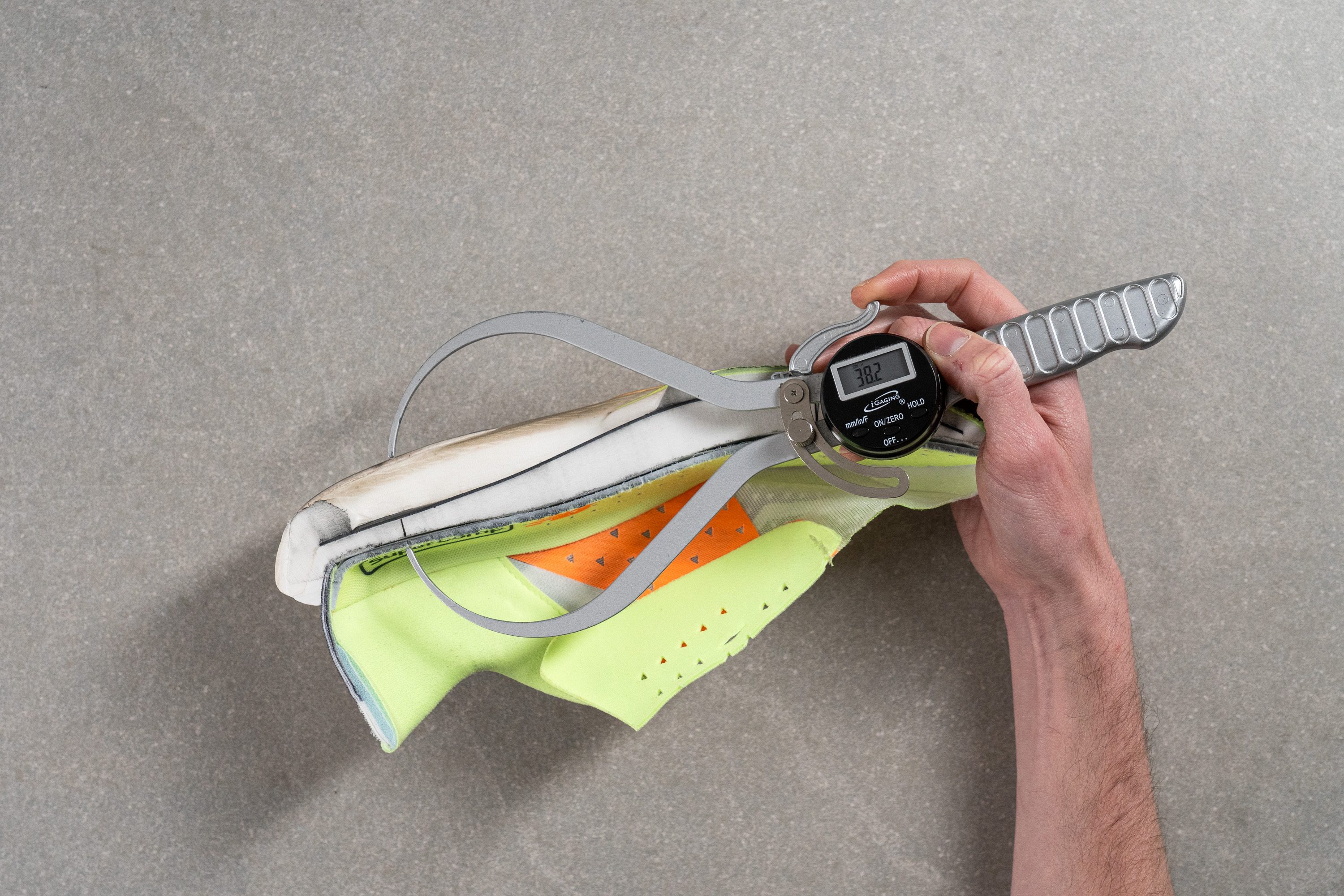
| FuelCell SuperComp Elite v4 | 38.2 mm |
| Average | 34.8 mm |
Forefoot stack
We measured the forefoot at a surprisingly low 28.9 mm, quite a deviation from New Balance's stated 36 mm.
Following World Athletics standards in our lab, we believe New Balance's measurements are likely taken closer to the midfoot. This discrepancy highlights the importance of our consistent measurement points for accurate comparisons.
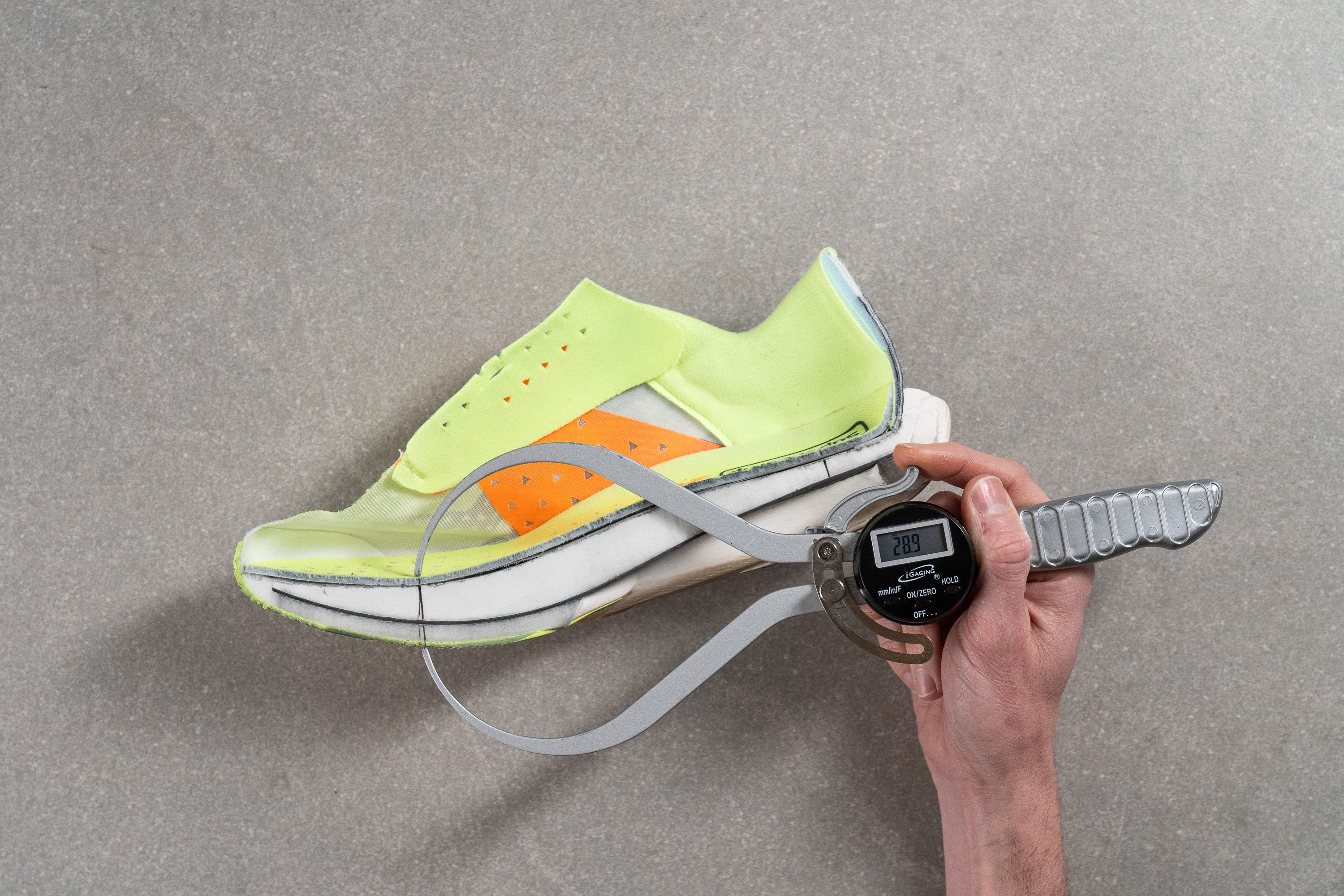
| FuelCell SuperComp Elite v4 | 28.9 mm |
| Average | 26.2 mm |
Drop
Given the significant discrepancy we uncovered, it was clear that the drop wouldn't align with the stated 4 mm. Our measurements revealed a surprising 9.3 mm drop.
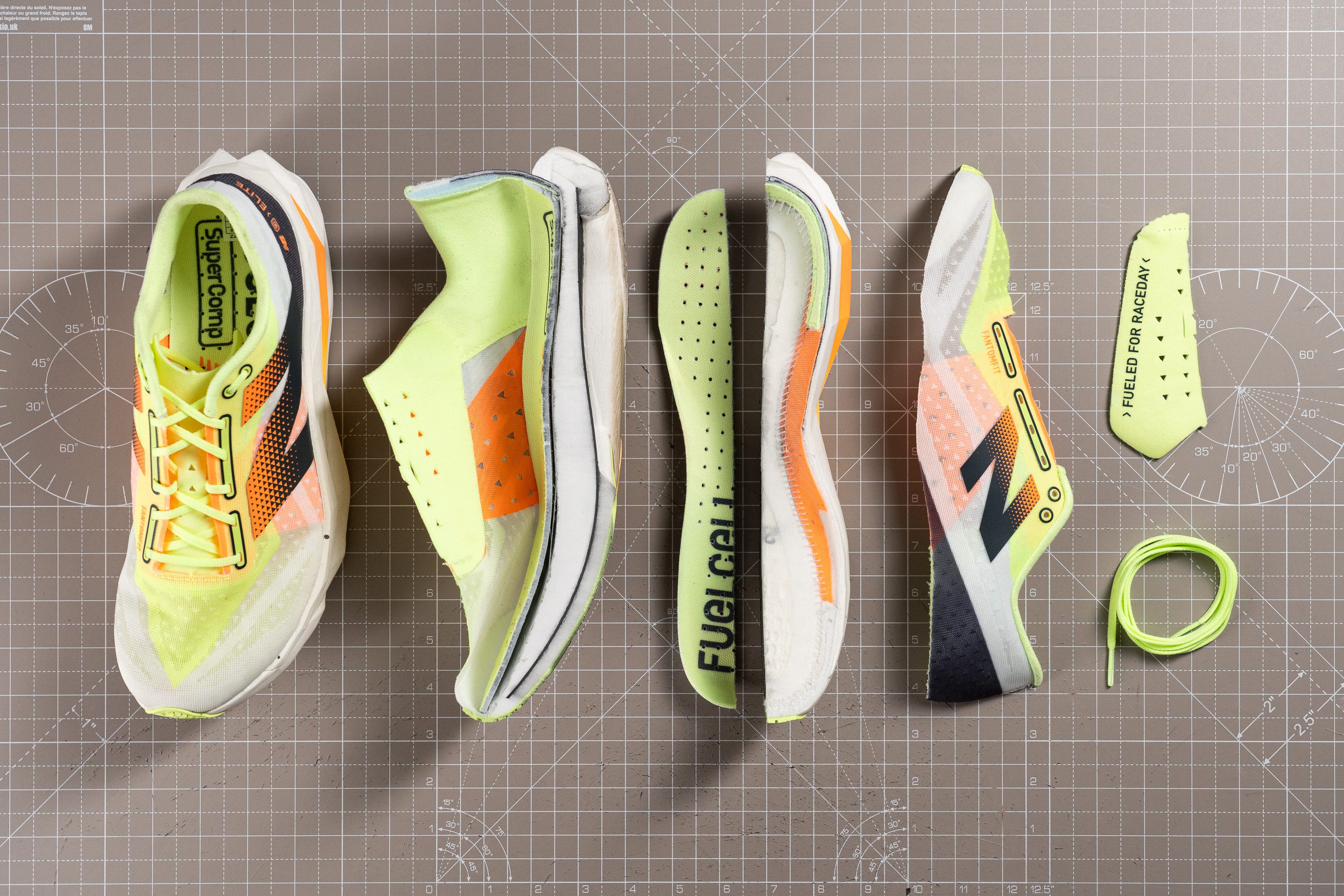
Despite this, the shoe feels notably less pronounced in its drop, thanks to the elevated midfoot. This design, featuring a lower heel, creates a distinct sensation. Midfoot and forefoot strikers might find the shoe feels more aggressive, while heel strikers may experience a low drop, accentuated by the foam's plush softness.
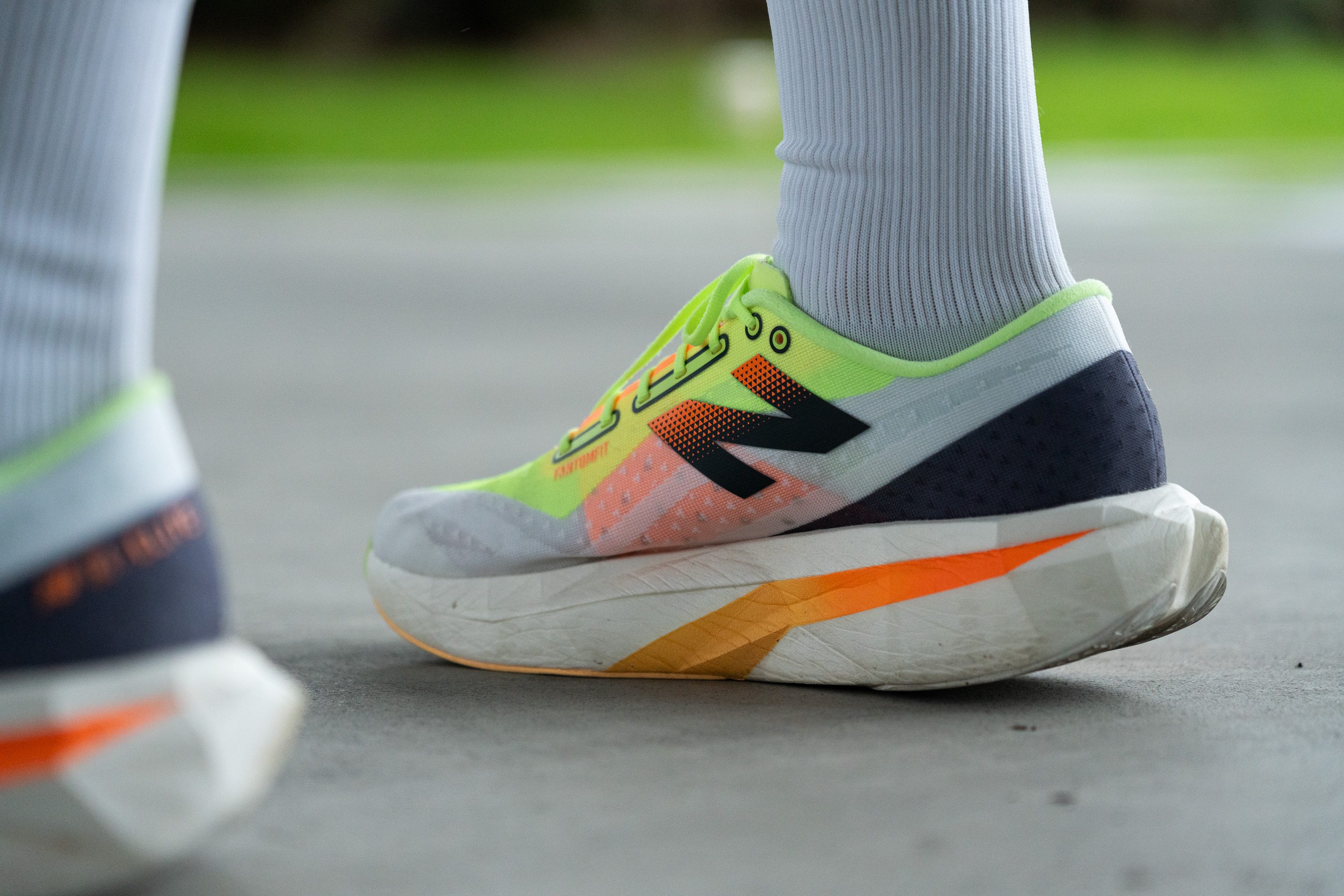
| FuelCell SuperComp Elite v4 | 9.3 mm |
| Average | 8.6 mm |
Midsole softness
The most significant upgrade in the Elite series is undoubtedly the foam. After much anticipation, New Balance has finally incorporated Pebax foam into their flagship racer for a top-tier, high-rebound performance.
Our tests confirmed the softness of the new Pebax FuelCell, with a 15.0-HA reading on the durometer. This softness elevates comfort levels above many rivals, yet we found the Elite v4 to be a tad slower and less responsive than most competitors.
Nevertheless, the introduction of a genuine superfoam marks a promising turning point for the Elite line, hinting at an exciting future for New Balance's racing shoes.
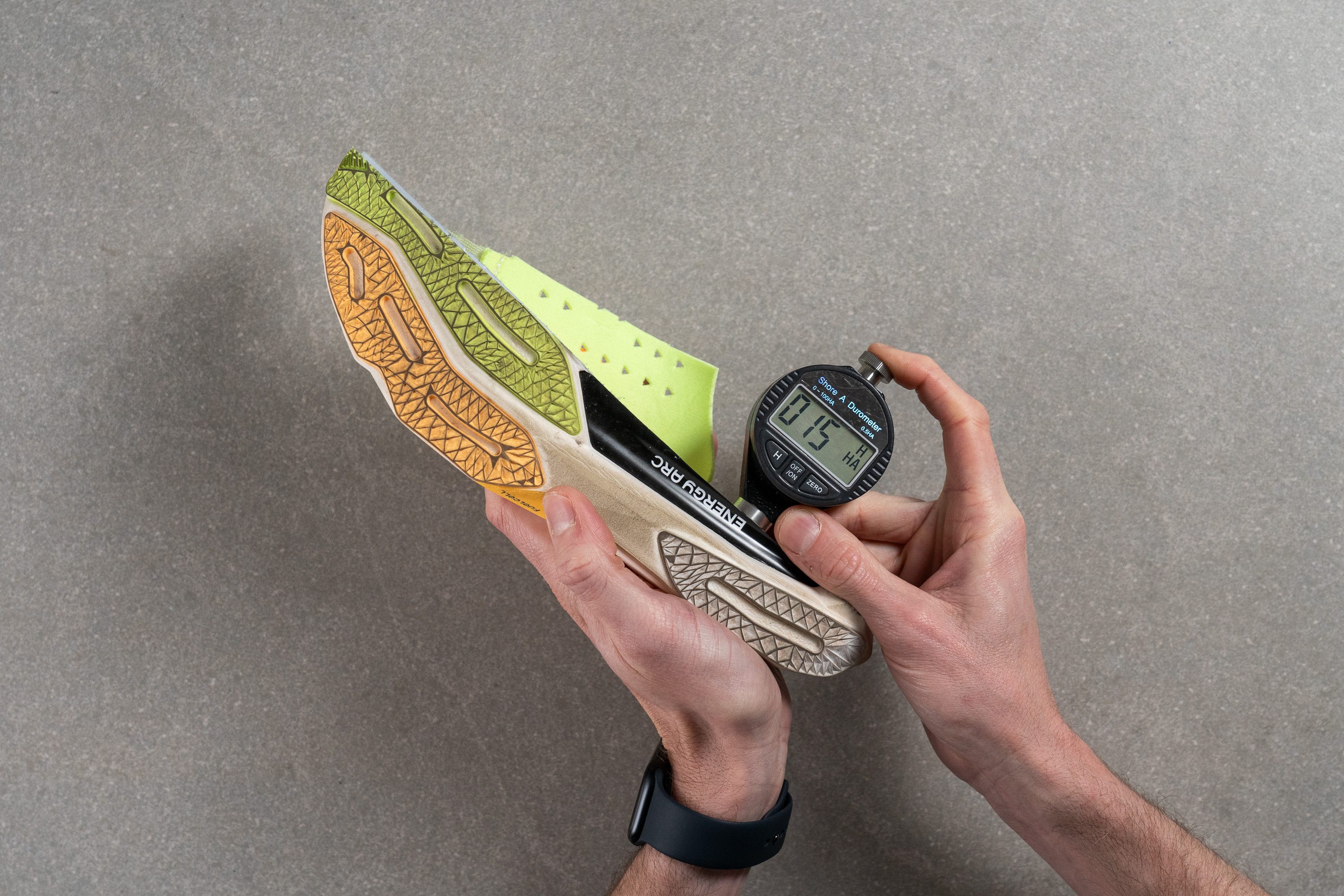
| FuelCell SuperComp Elite v4 | 15.0 HA |
| Average | 20.4 HA |
Rocker
Here at RunRepeat's lab, we test shoes from all the top brands, and New Balance has consistently impressed us with their smooth, high-rockered designs in many models we've evaluated, such as the SuperComp Trainer v2.
For fans of rockered running shoes, the Elite v4 is sure to please. It showcases a prominent early-stage toe rocker that's crucial for the shoe's performance. We've discovered in our test runs that without this feature, moving from heel to toe could feel much harder due to the shoe's unique geometry.
Plate
This is New Balance's first true super shoe, mixing a carbon plate and, finally, Pebax-based ultra-resilient foam.
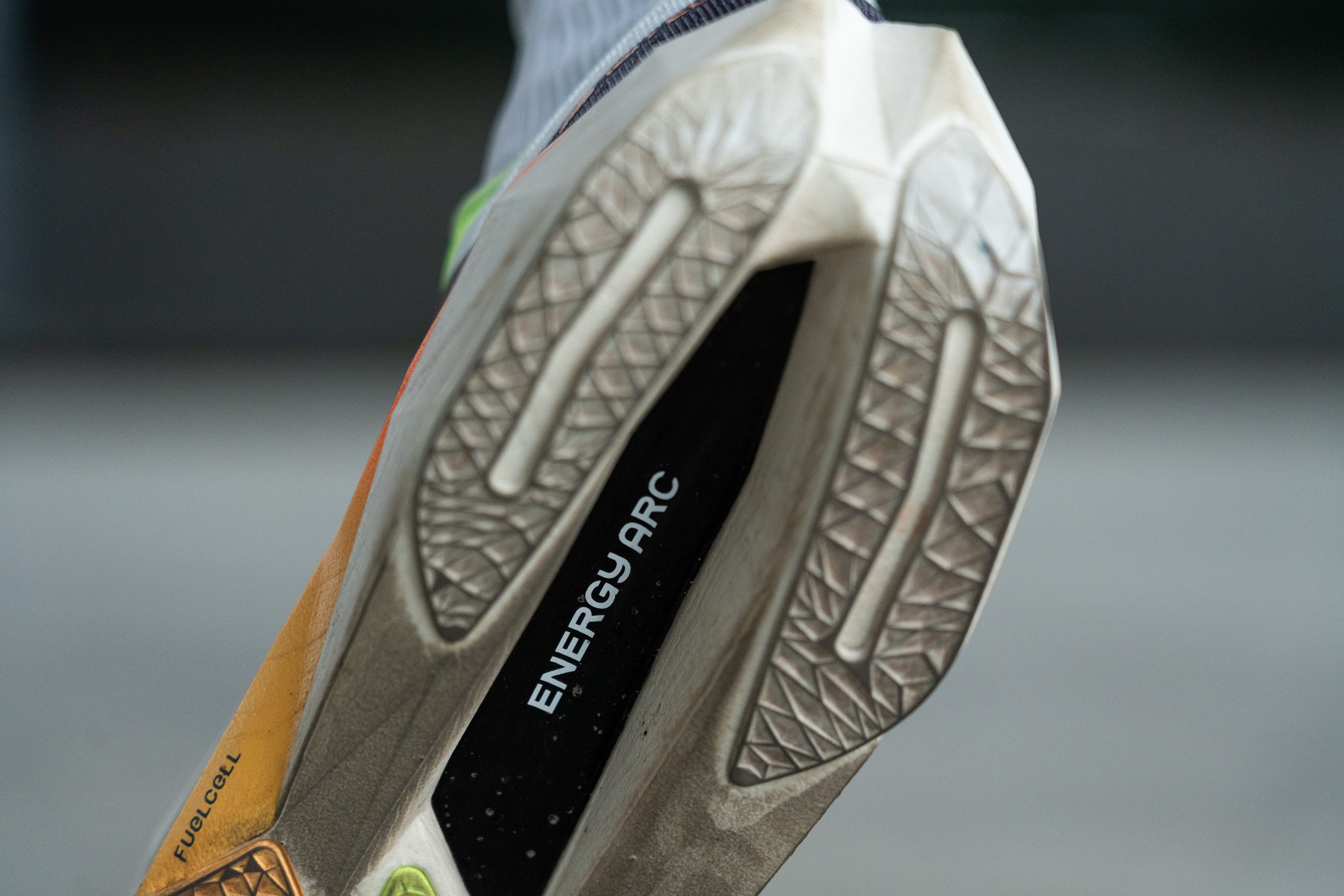
While we've touched on the foam's merits, the Energy ARC carbon plate deserves its own spotlight. It's uniquely designed with multiple curves instead of the standard flat shape, enhancing flexibility and comfort during runs.
This design choice makes the Elite v4 a more forgiving option underfoot compared to other super shoes, distinct from the more aggressive and responsive feel of racers like the Saucony Endorphin Elite.
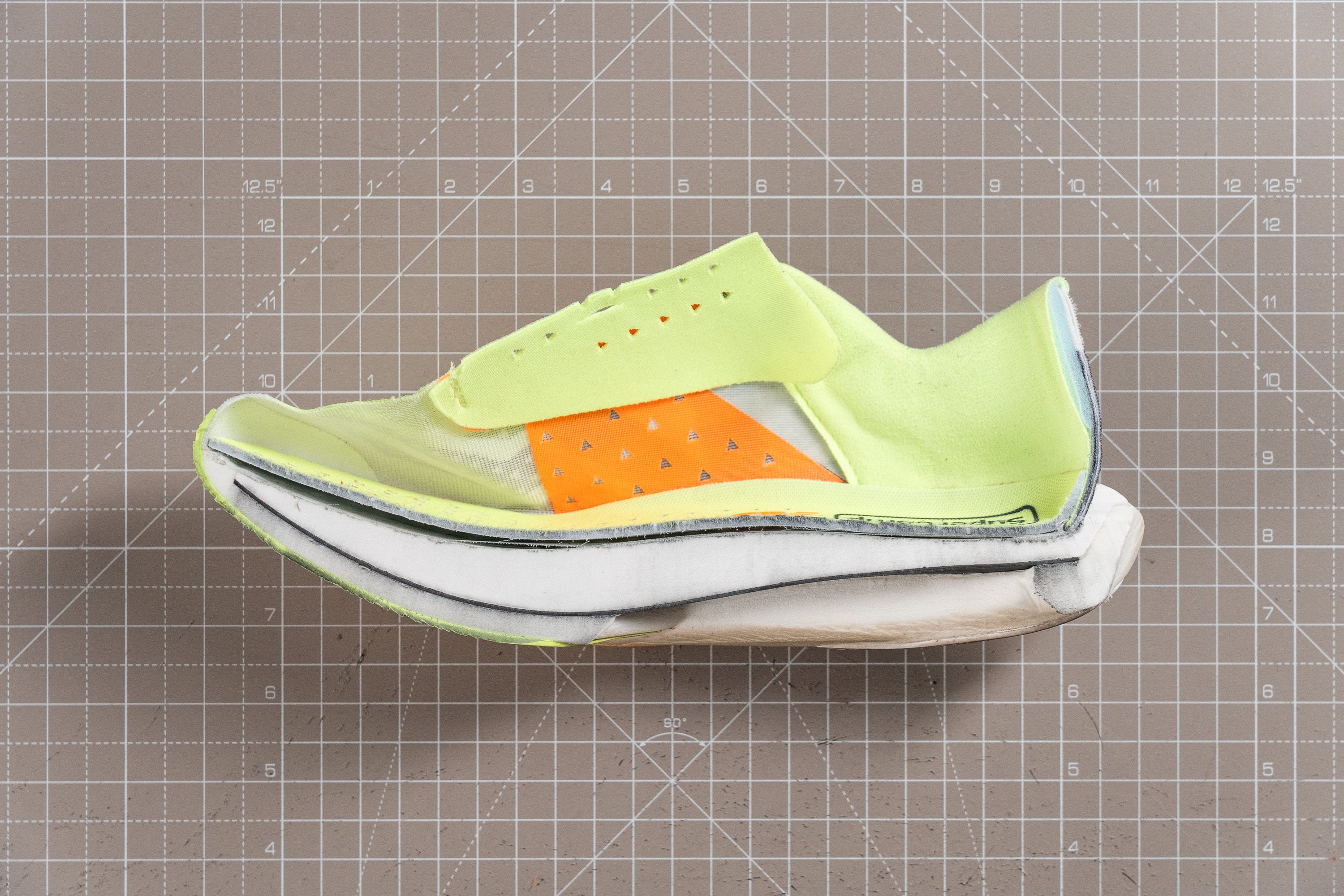
Size and fit
Size
New Balance FuelCell SuperComp Elite v4 fits half size small (165 votes).
Consider sizing up
Internal length
| FuelCell SuperComp Elite v4 | 267.4 mm |
| Average | 269.4 mm |
Width / Fit
One key reason we enjoyed logging long runs in the SuperComp Elite v4 is its exceptional upper.
Accustomed to tight, race-ready uppers, we found this one delightfully roomy, much like a premium daily trainer, with a super-generous width (for being a racing shoe) of 96.0 mm at its broadest part.
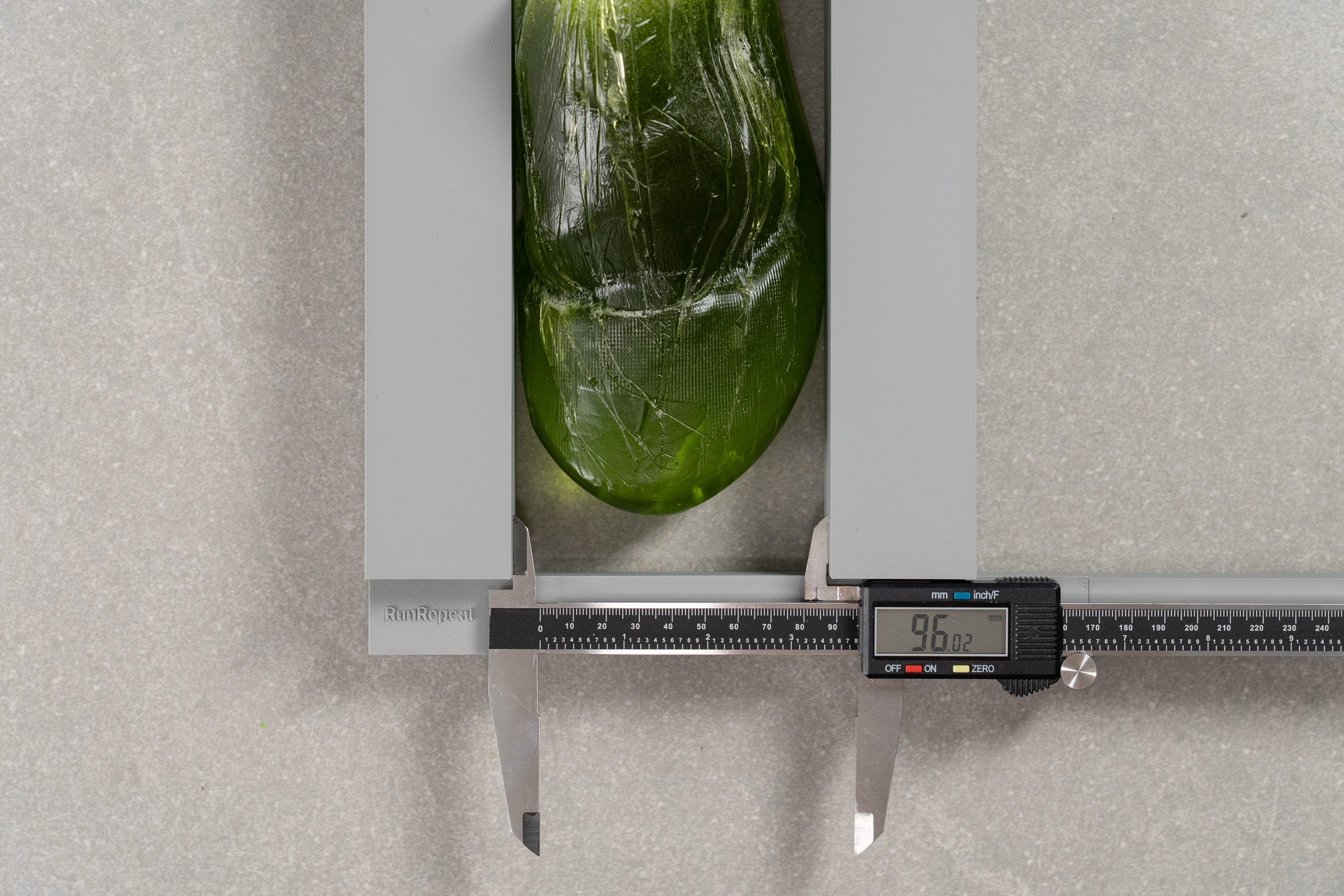
| FuelCell SuperComp Elite v4 | 96.0 mm |
| Average | 95.1 mm |
Toebox width
With a crazy-wide 78.4 mm space in the big toe area, we found that the toebox offers incredible roominess despite being a shoe for racing, making it a dream for runners prone to blisters on their big or pinky toes, or simply those with wide feet.
Furthermore, in certain countries, New Balance offers this shoe in a 2E width—a rare find among super shoes.
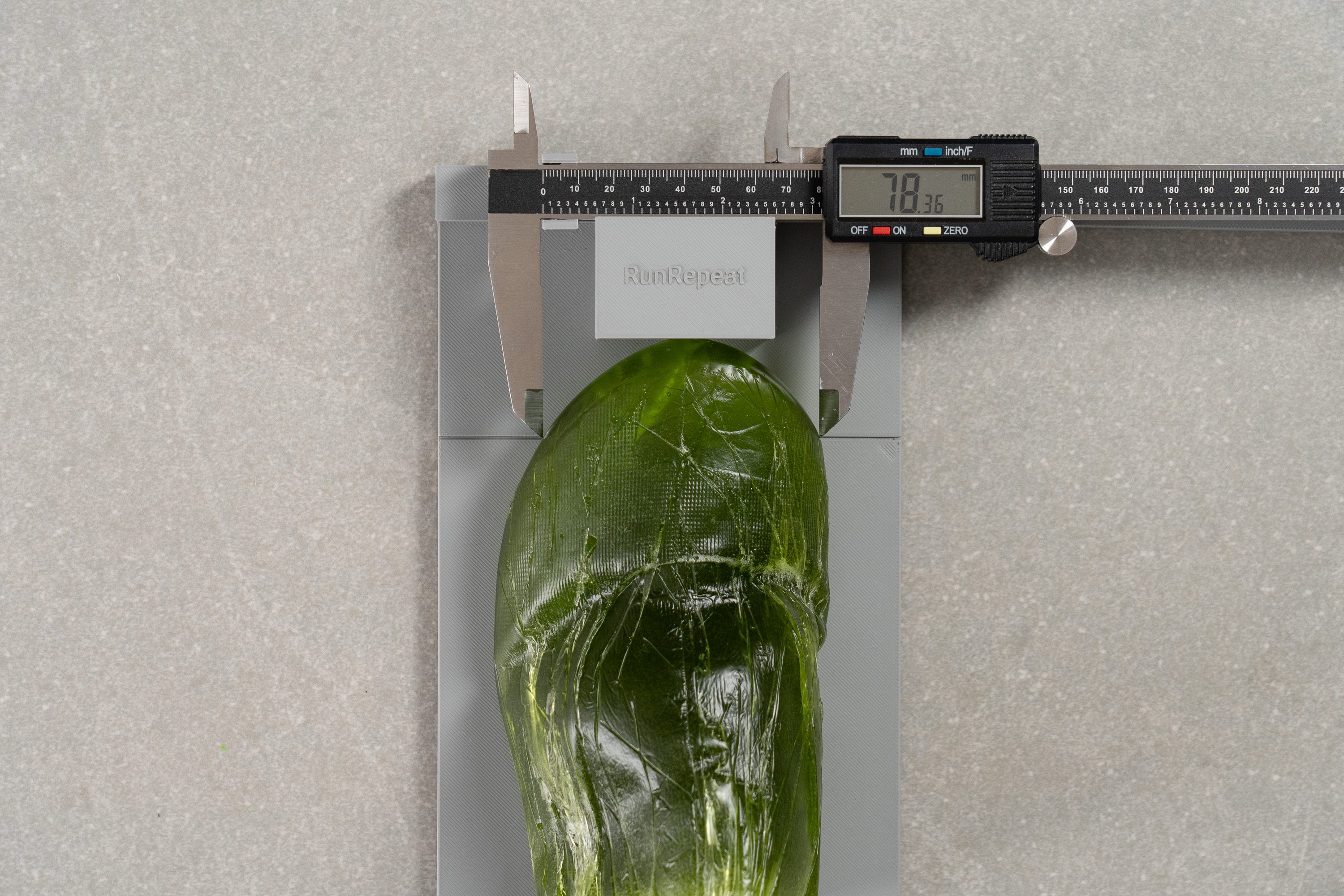
| FuelCell SuperComp Elite v4 | 78.4 mm |
| Average | 73.3 mm |
Toebox height
We found that the toe area, measuring 27.3 mm, provides generous vertical space for upward movement—an impressive feature given the super shoe status of the Elite v4.
While snug-fit enthusiasts may find it less appealing, this design is a game-changer for runners who previously struggled to find a racing shoe with such accommodating dimensions.
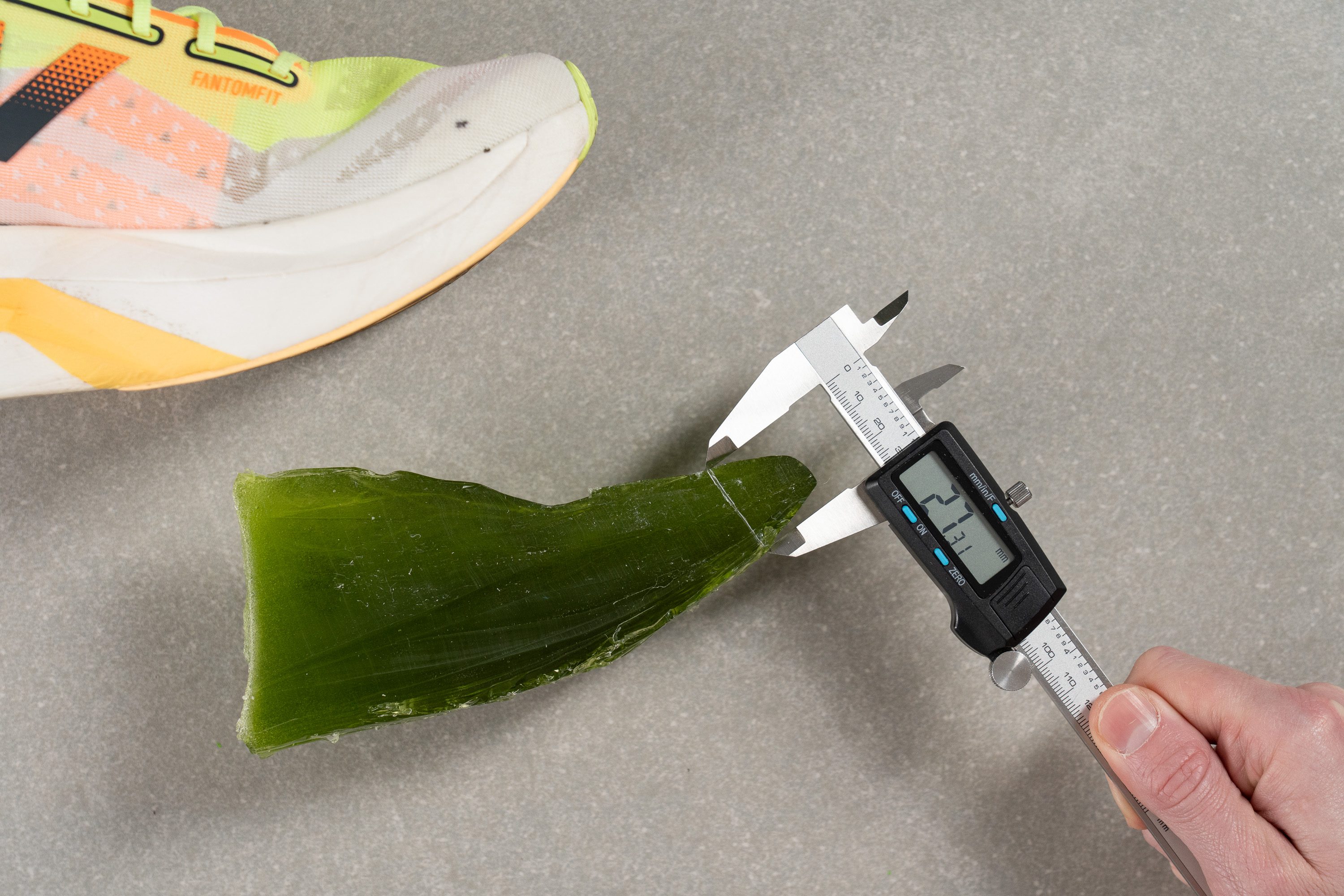
| FuelCell SuperComp Elite v4 | 27.3 mm |
| Average | 27.0 mm |
Traction / Grip
Traction test
A rainy day shouldn't stop you from achieving a new personal best and we are glad that the SuperComp Elite v4 has a good grip to keep you covered on wet roads.
While it's not as tacky as the ASICSGRIP or the Adidas Continental, the shoe's soft rubber blend returned a solid friction score of 0.46 in our SATRA TM144 grip test. That's good enough to keep you surefooted on slick concrete.
| FuelCell SuperComp Elite v4 | 0.46 |
| Average | 0.49 |
Outsole design
The SC Elite v4 boasts significantly more rubber coverage compared to other super shoes, hinting at enhanced longevity. However, this added protection comes with the trade-off of increased weight. It's just another reason why we think it's perfect for back-of-the-pack marathoners.
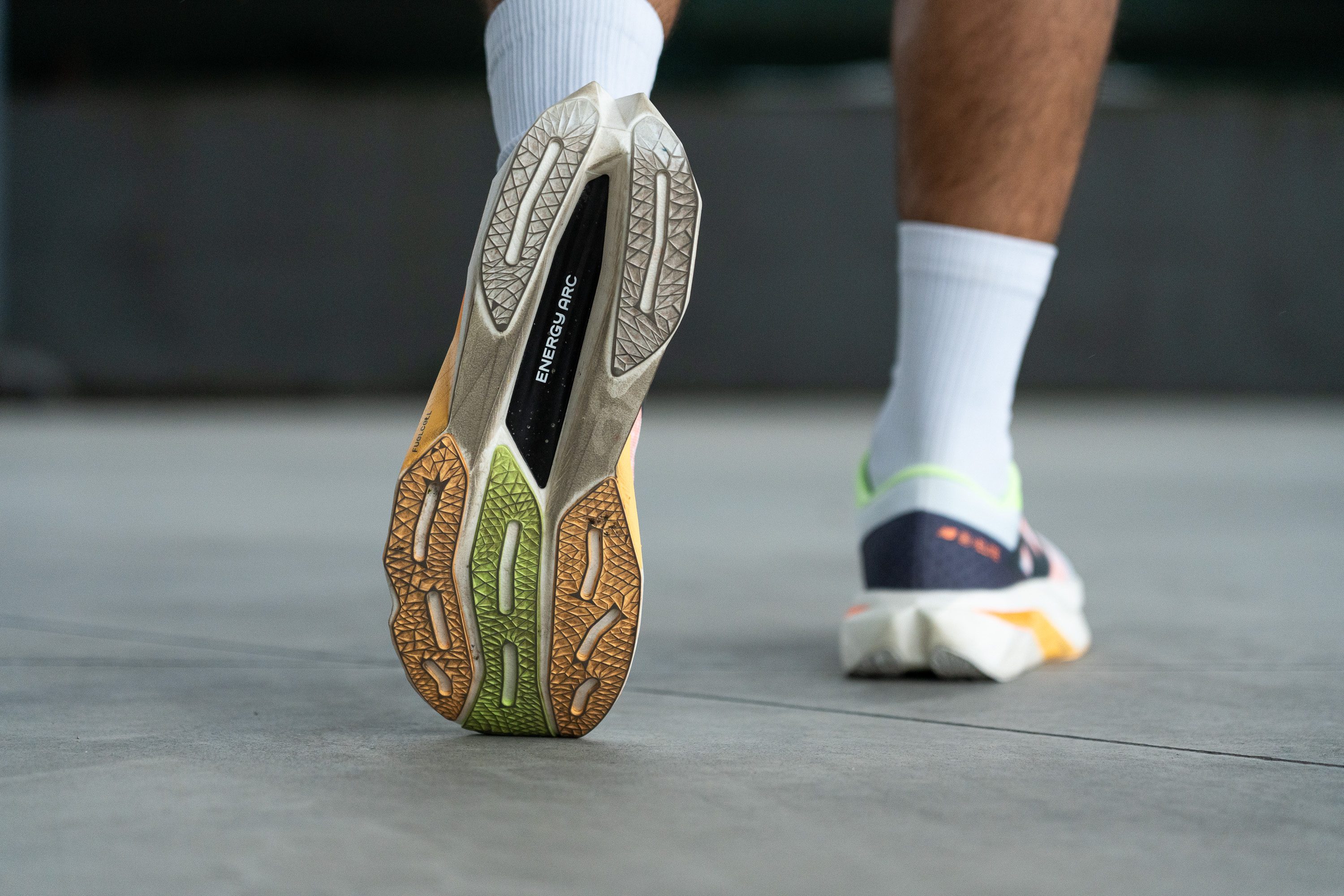
Flexibility / Stiffness
Throughout our lab review, we've emphasised New Balance's positioning of this shoe as a more comfortable, less aggressive super shoe, arguably tailored for mid-to-back-of-the-pack marathon runners.
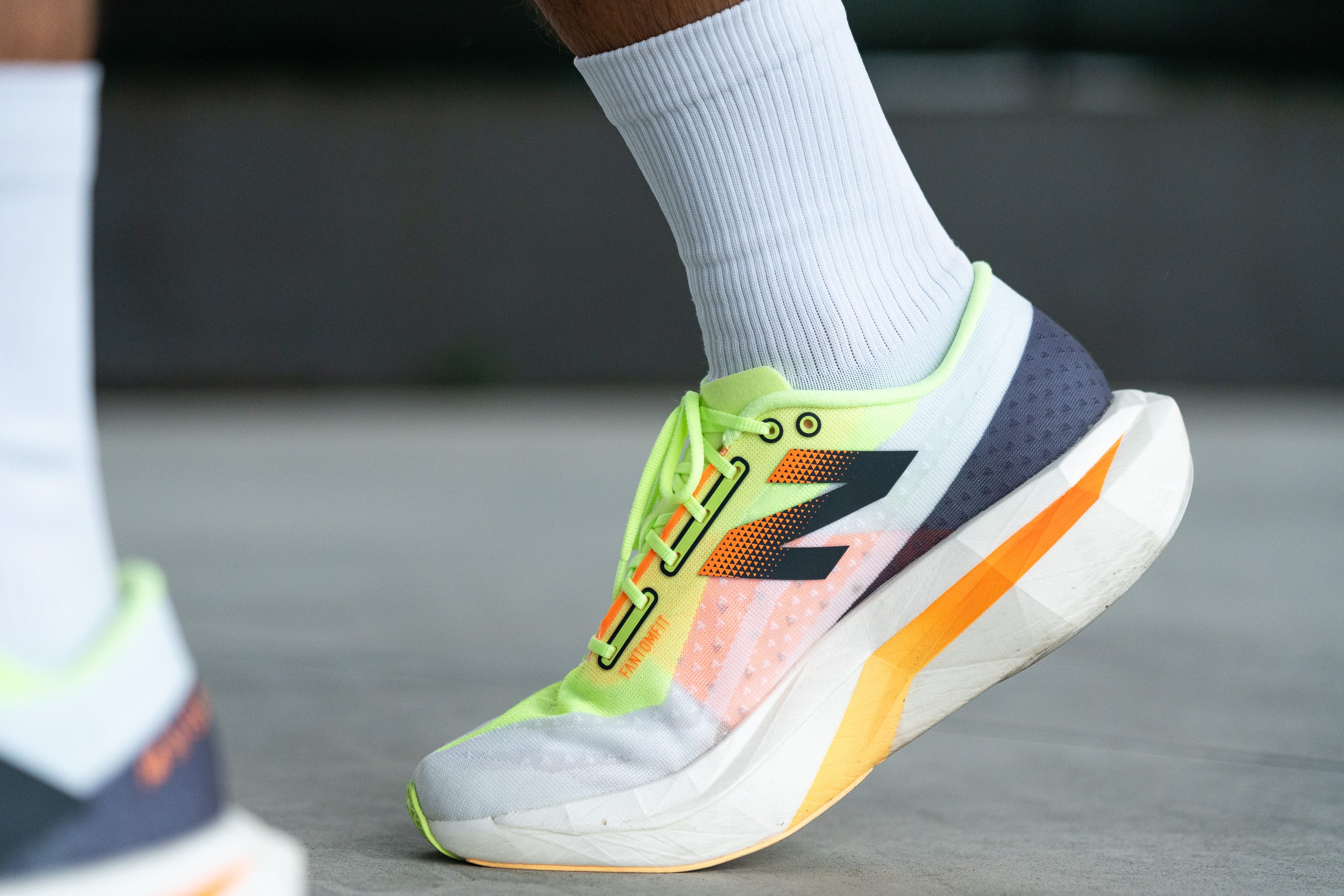
This led us to discover that the carbon plate in this model is significantly less stiff compared to others, resembling more the flexibility of a nylon plate, similar to what we've seen in models like the Endorphin Speed 4. In our 30-degree bend test, it just scored only slightly higher than average at 18.4N.
| FuelCell SuperComp Elite v4 | 18.4N |
| Average | 15.3N |
Stiffness in cold (%)
Following the same approach as with the midsole, we placed the shoe in the freezer for 20 minutes to assess changes in stiffness.
Upon reevaluation, we noted a mere 3.9% increase in stiffness—an exceptional outcome that underscores the superior performance of the Pebax midsole in cold conditions.
| FuelCell SuperComp Elite v4 | 4% |
| Average | 33% |
Weight
There's no way to sugarcoat it—the Elite v4 tips the scales at a hefty 8.2 oz or 232g, making it unusually heavy for a super shoe.
This weight exceeds today's racing super shoe standards. Competitors like Nike, Adidas, Hoka, ASICS, and Saucony offer lighter options, some even more than an ounce lighter, setting a high bar that the Elite v4 currently simply fails to meet.
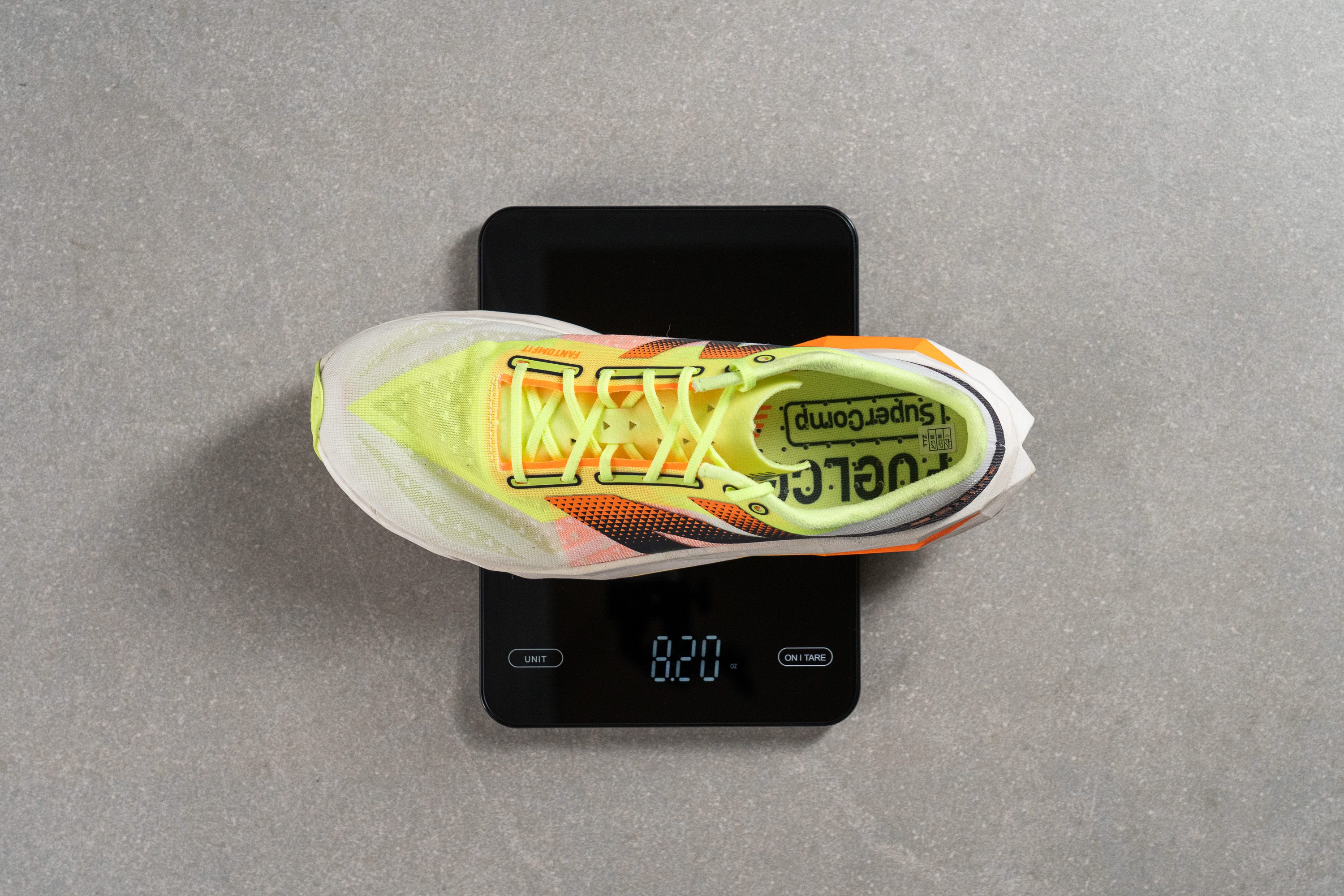
| FuelCell SuperComp Elite v4 | 8.2 oz (232g) |
| Average | 9.3 oz (264g) |
Breathability
At first glance, the NB SC Elite v4's all-new Fantomfit upper lacks any ventilation holes, sparking concerns about breathability. But we're not ones to speculate—we prefer to dive into the facts in the lab, starting with the smoke test.
Our findings were surprising. Despite the absence of visible holes, the engineered mesh of the Elite v4 performed admirably, scoring a solid 4/5. It may not be the absolute best in the super shoe category, but it's more than sufficient, especially when you consider that most marathons occur in cooler conditions.
The secret behind the Fantomfit technology—while not new to New Balance, this marks its debut in the Elite series—is its ultra-thin design, allowing light and air to pass through with ease.
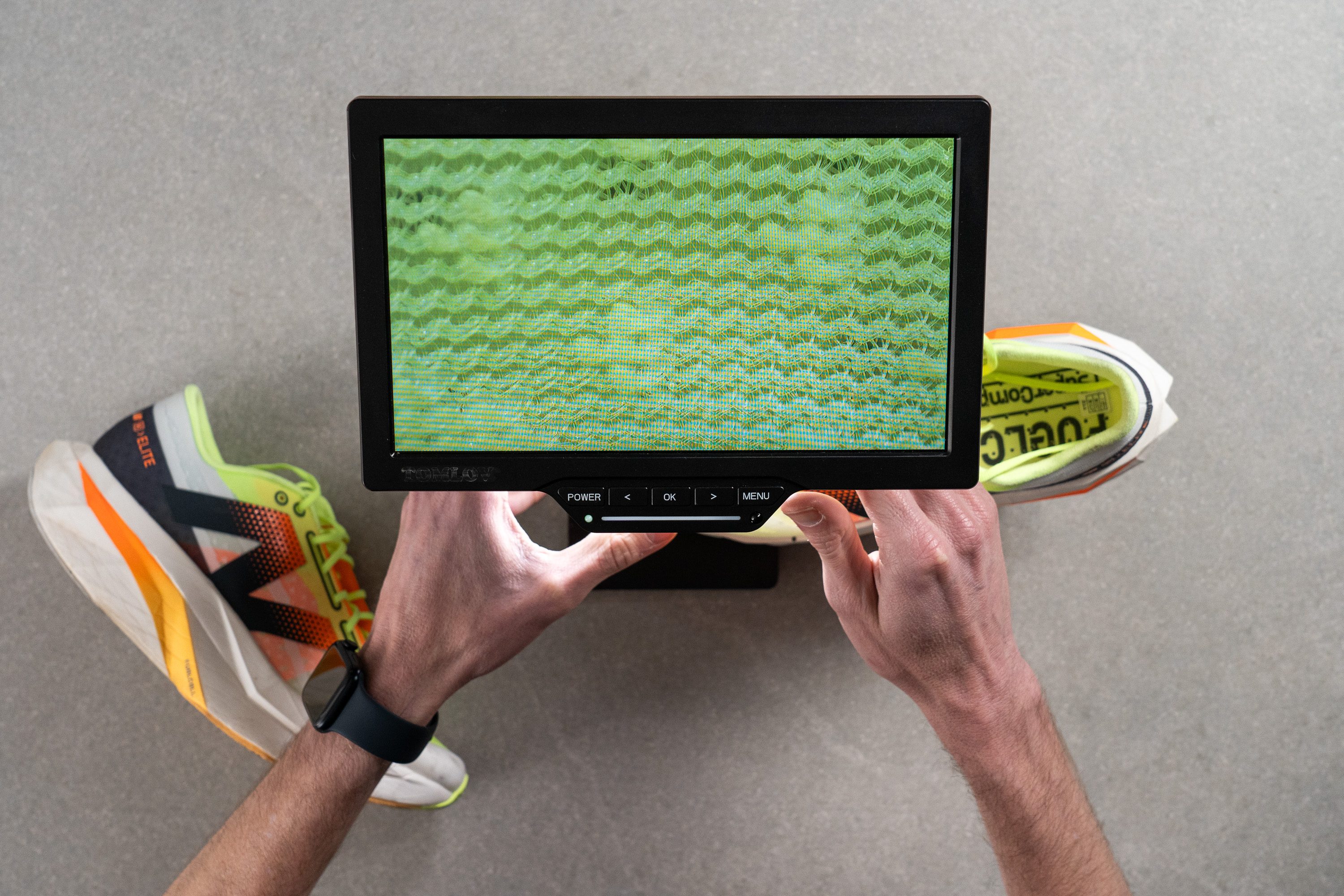
Under the microscope, we discovered a premium, low-density engineered mesh that manages airflow without the need for traditional ventilation holes.
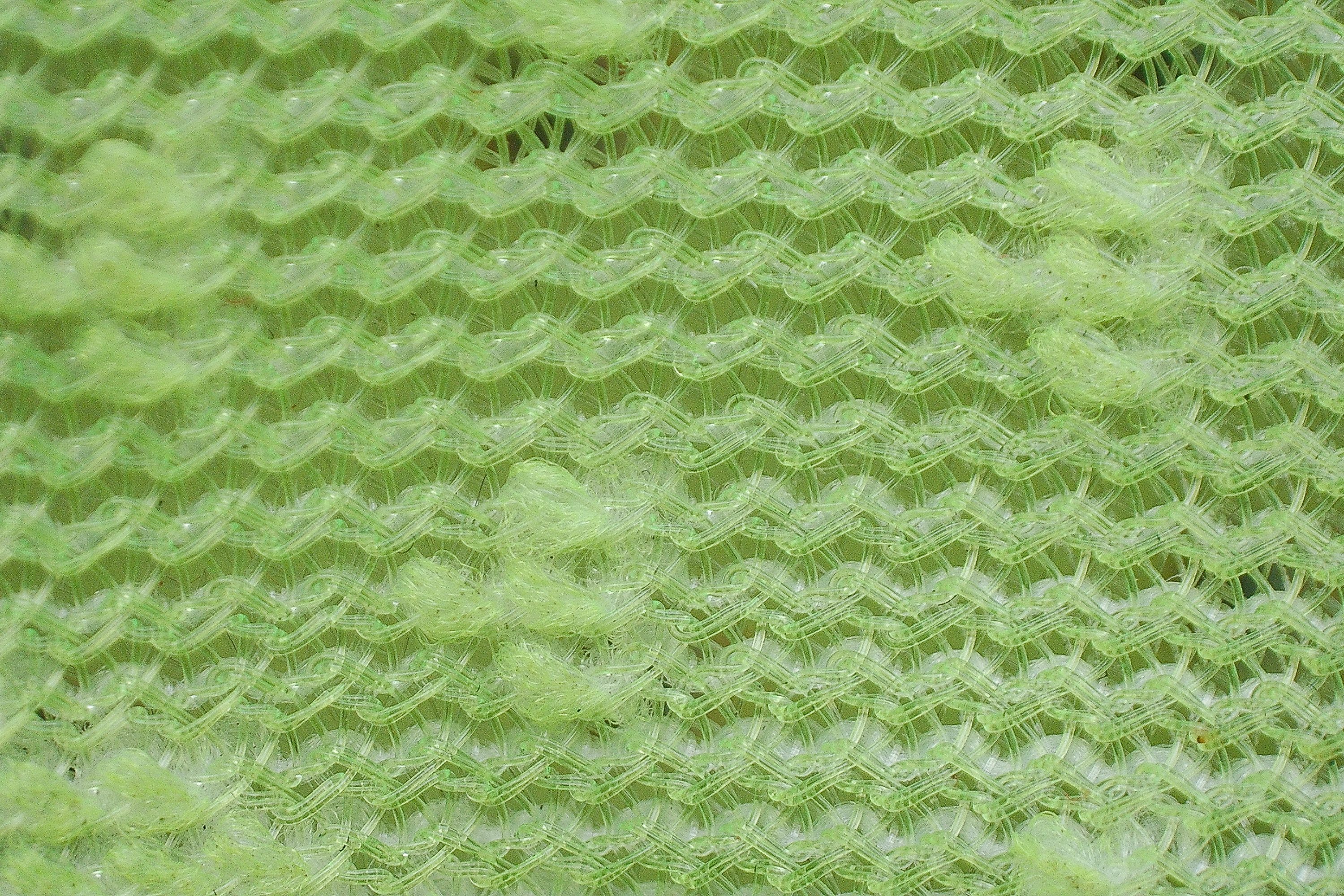
Upon dissecting the entire upper, we noted it offers decent padding for a racing shoe.
However, it lacks elasticity, so it's essential to find the perfect fit from the start—as it's likely to remain unchanged over time.
| FuelCell SuperComp Elite v4 | 4 |
| Average | 3.7 |
Stability
Lateral stability test
Pairing a towering stack height with a marshmallow-soft midsole often leads to stability concerns—exactly what we encountered with the SC Elite v4.
The signature plushness of the SC Elite series foam remains intact, a clear testament to New Balance's commitment to comfort over performance. To enhance stability, we noted substantial midsole sidewalls, an expanded base, and, of course, the carbon plate. Despite these efforts, the SC Elite v4 ranks as one of the less stable super shoes for us.
This stability trade-off can be both a drawback and an advantage. Sure, stability is typically sought after, but sometimes it can take away from the exhilarating, fun ride some runners crave. Ultimately, the choice is yours.
Torsional rigidity
Featuring a carbon plate, the shoe's torsional rigidity is palpable, scoring a solid 4/5 in our lab tests—just shy of the max score.
This makes the shoe stand out from other super shoes, making it ideal for fast-paced, long-distance workouts. For those who appreciate the benefits of carbon plates, this shoe serves as an excellent—though costly—option for marathon prep.
| FuelCell SuperComp Elite v4 | 4 |
| Average | 3.5 |
Heel counter stiffness
The heel boasts some structure, a notable departure from the norm seen in other competition shoes—a deliberate choice by New Balance to offset the instability from the plush foam. Our evaluation led to a score of 2/5.
| FuelCell SuperComp Elite v4 | 2 |
| Average | 2.9 |
Midsole width - forefoot
In the lab, the midsole width of the shoe initially seemed substantial, particularly after the initial unboxing, which made the shoe appear quite large. However, measurements with the callipers revealed a width of 114.6 mm, placing it squarely within the average range for running shoes.
Though a broader base could have enhanced stability, achieving such a design without increasing the shoe's already significant weight presents a challenge. Unless New Balance opts to hollow out the central forefoot channel similar to what they've done in the heel, a wider landing base makes no sense.
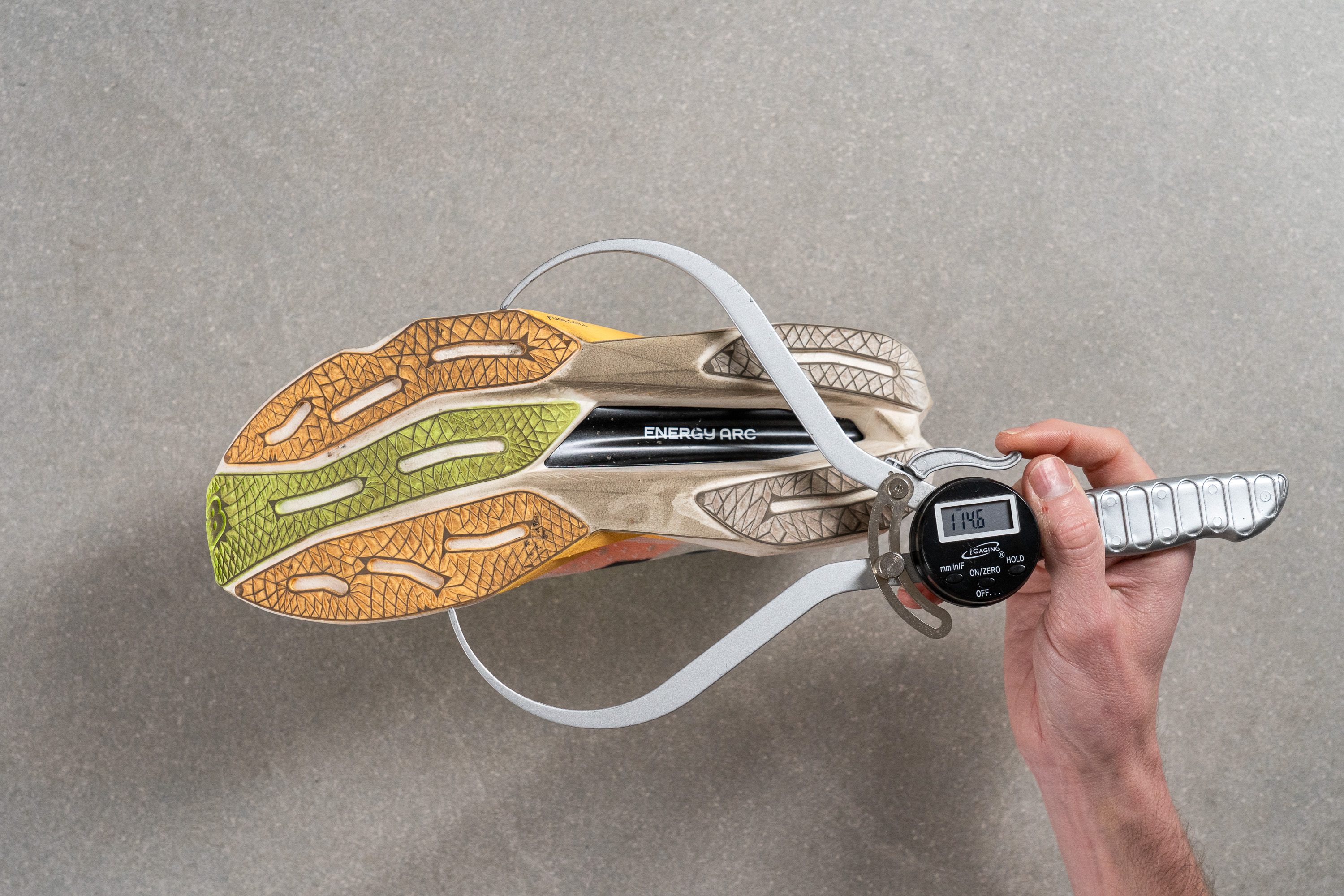
| FuelCell SuperComp Elite v4 | 114.6 mm |
| Average | 114.4 mm |
Midsole width - heel
We measured the heel at 88.7 mm, which seems typical for a racing shoe. However, when combined with the gap in the midsole and the overly soft foam, it leads to a notably unstable ride, particularly for heel strikers.
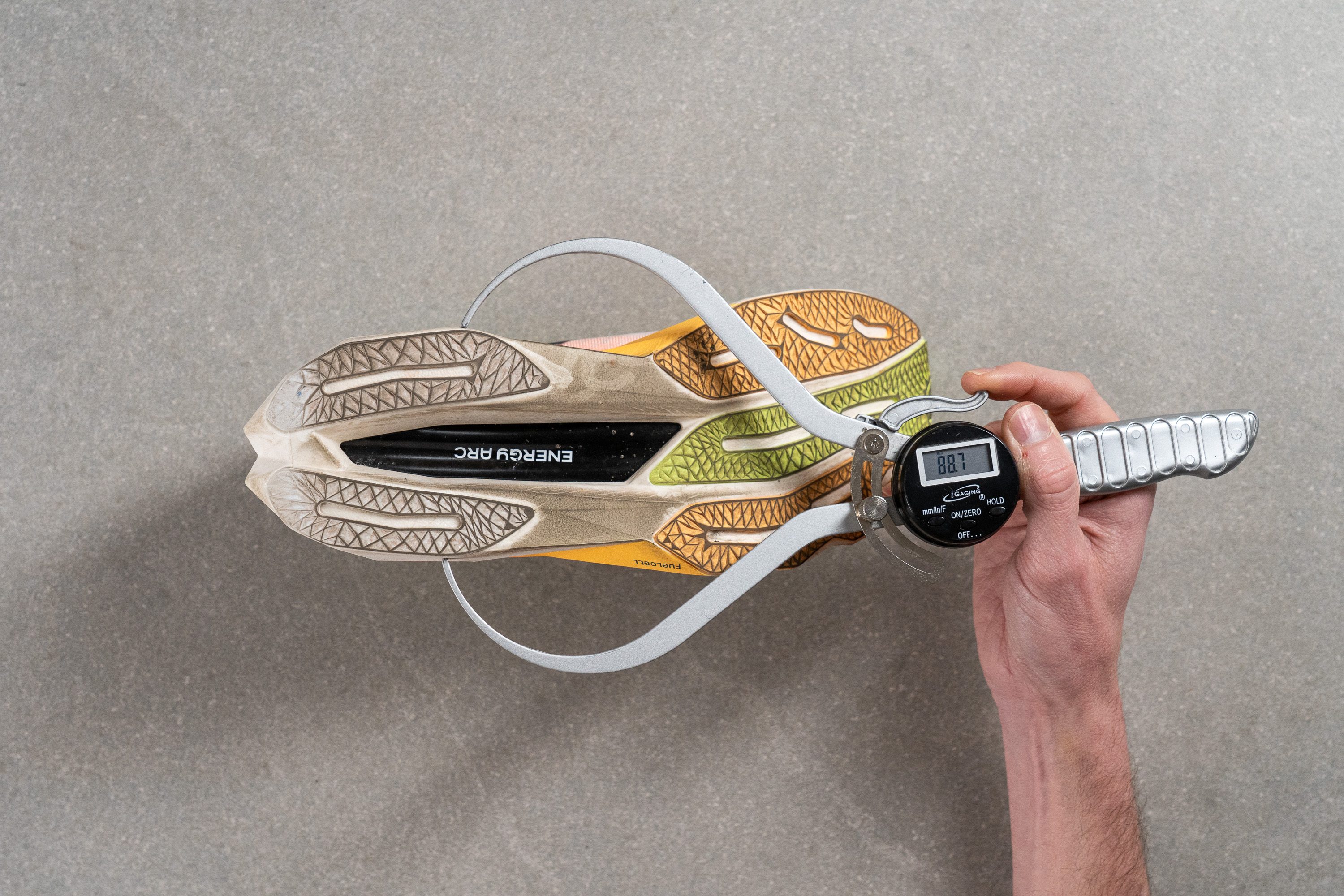
| FuelCell SuperComp Elite v4 | 88.7 mm |
| Average | 90.6 mm |
Durability
Toebox durability
After confirming the upper's decent ventilation, we were curious about its durability—a trait not often found in tandem.
Using the Dremel at 5K RPM to test the upper's resilience, we arrived at a 2/5 score. While not entirely unexpected for such a shoe, this outcome left us somewhat underwhelmed, underscoring a potential area for improvement in future iterations.
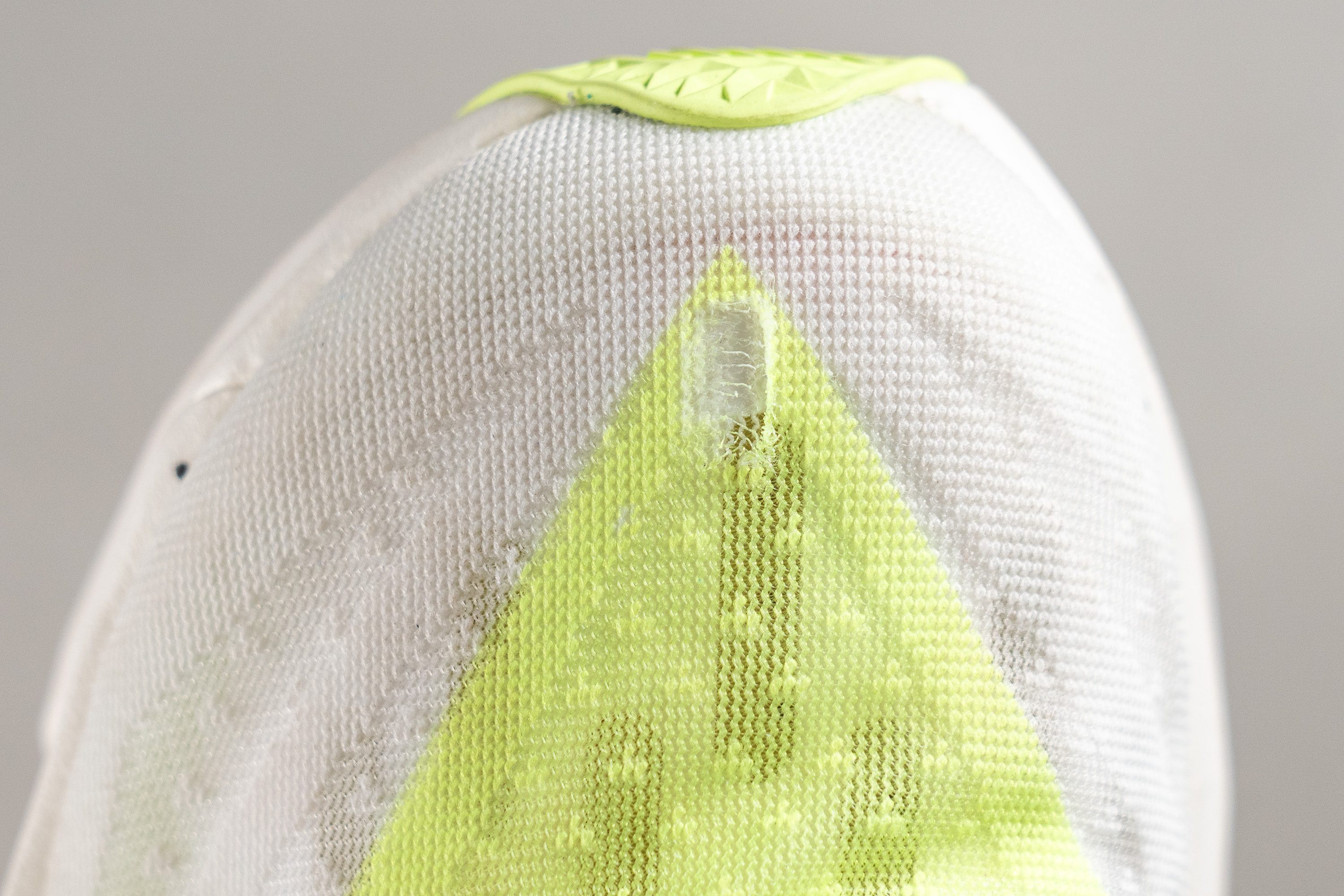
| FuelCell SuperComp Elite v4 | 2 |
| Average | 2.6 |
Heel padding durability
Turning our attention to the heel, we hoped for a more promising outcome here, since this area typically shows wear quicker than the rest of the shoe.
Applying the same Dremel test, the Elite v4 slightly improved, securing a 3/5 rating. While this is an acceptable score, considering its £250 price tag, we still believe there's room for significant enhancement.
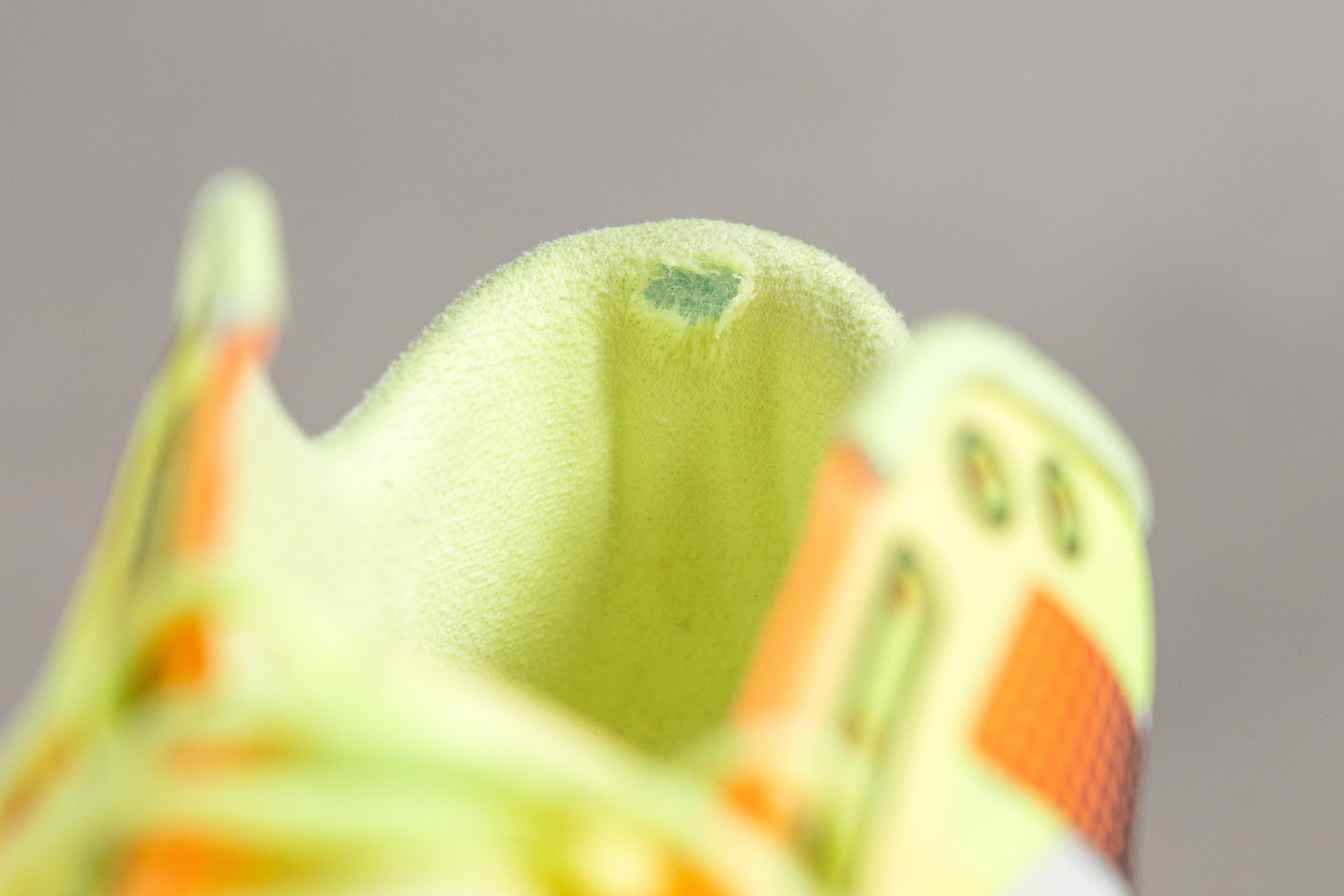
| FuelCell SuperComp Elite v4 | 3 |
| Average | 3.4 |
Outsole hardness
Turning our focus to the outsole, a critical area for supershoes due to concerns about longevity, we encountered a predictable result.

Our durometer test yielded a 64.4 HC reading, indicating New Balance has opted for an exceptionally soft rubber compound in this model—akin to the high-performance soft tyres used in Formula 1. Might this compromise the shoe's durability over time? Let's see!
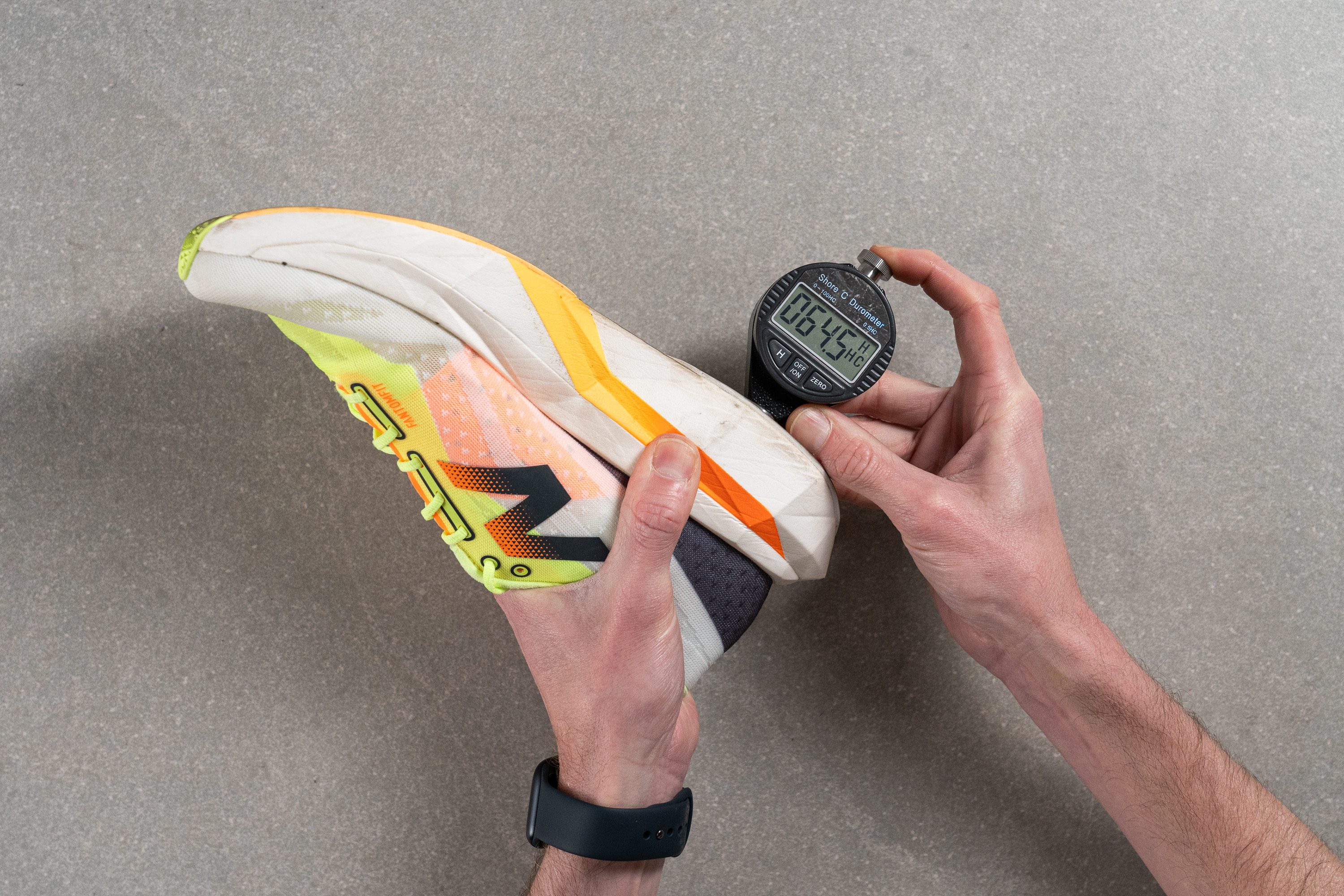
| FuelCell SuperComp Elite v4 | 64.4 HC |
| Average | 79.2 HC |
Outsole durability
We switched on the Dremel one last time to assess the outsole's durability. We were pleasantly surprised by the results!
After subjecting the outsole to the Dremel's rigour, we observed a mere 0.8 mm indentation. Considering the softness of the rubber, this result is impressive, proving that the Elite v4 not only offers good grip but also promising durability.
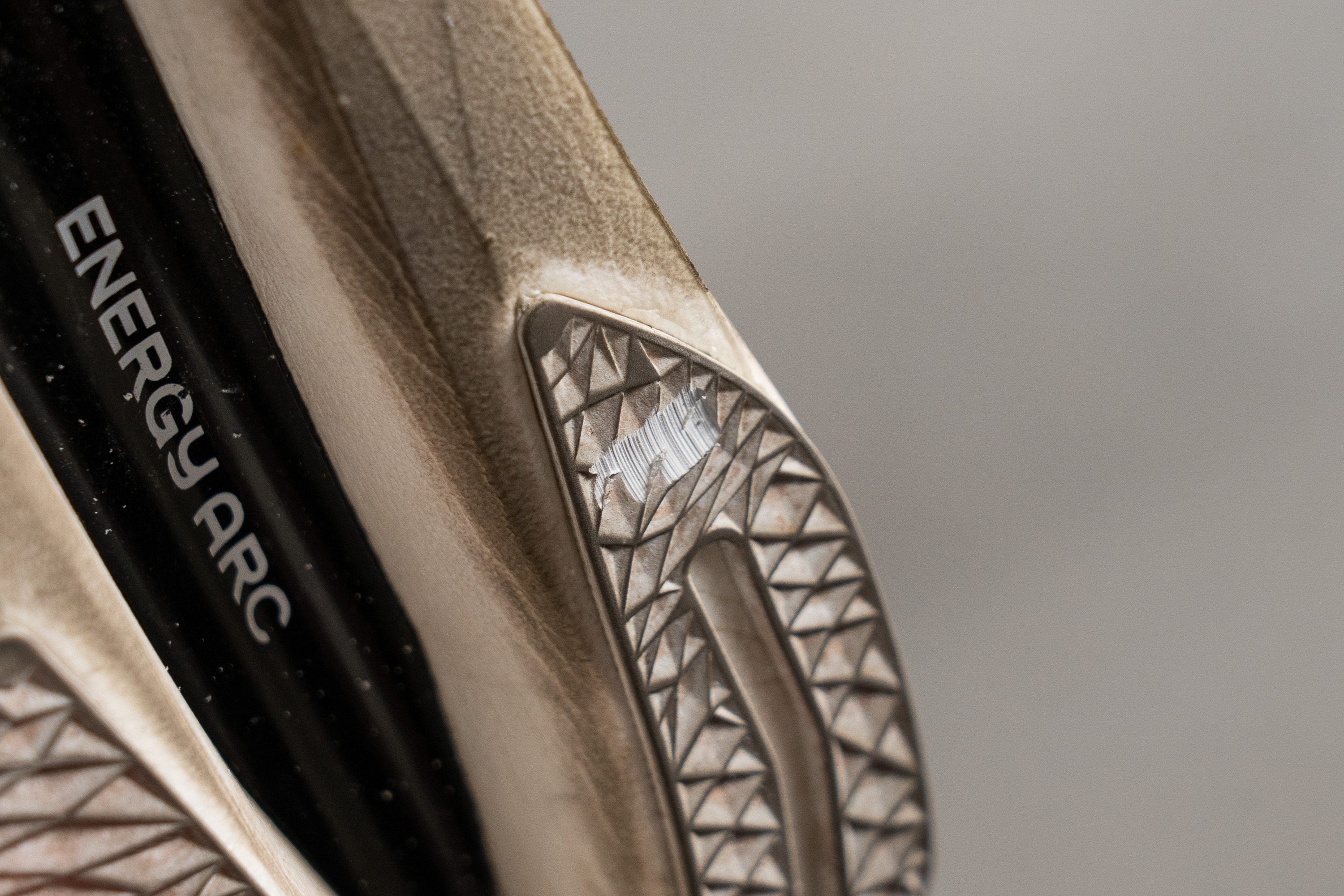
| FuelCell SuperComp Elite v4 | 0.8 mm |
| Average | 1.1 mm |
Outsole thickness
In our final step, we measured the outsole thickness using our vernier calliper, recording a thickness of 2.0 mm.
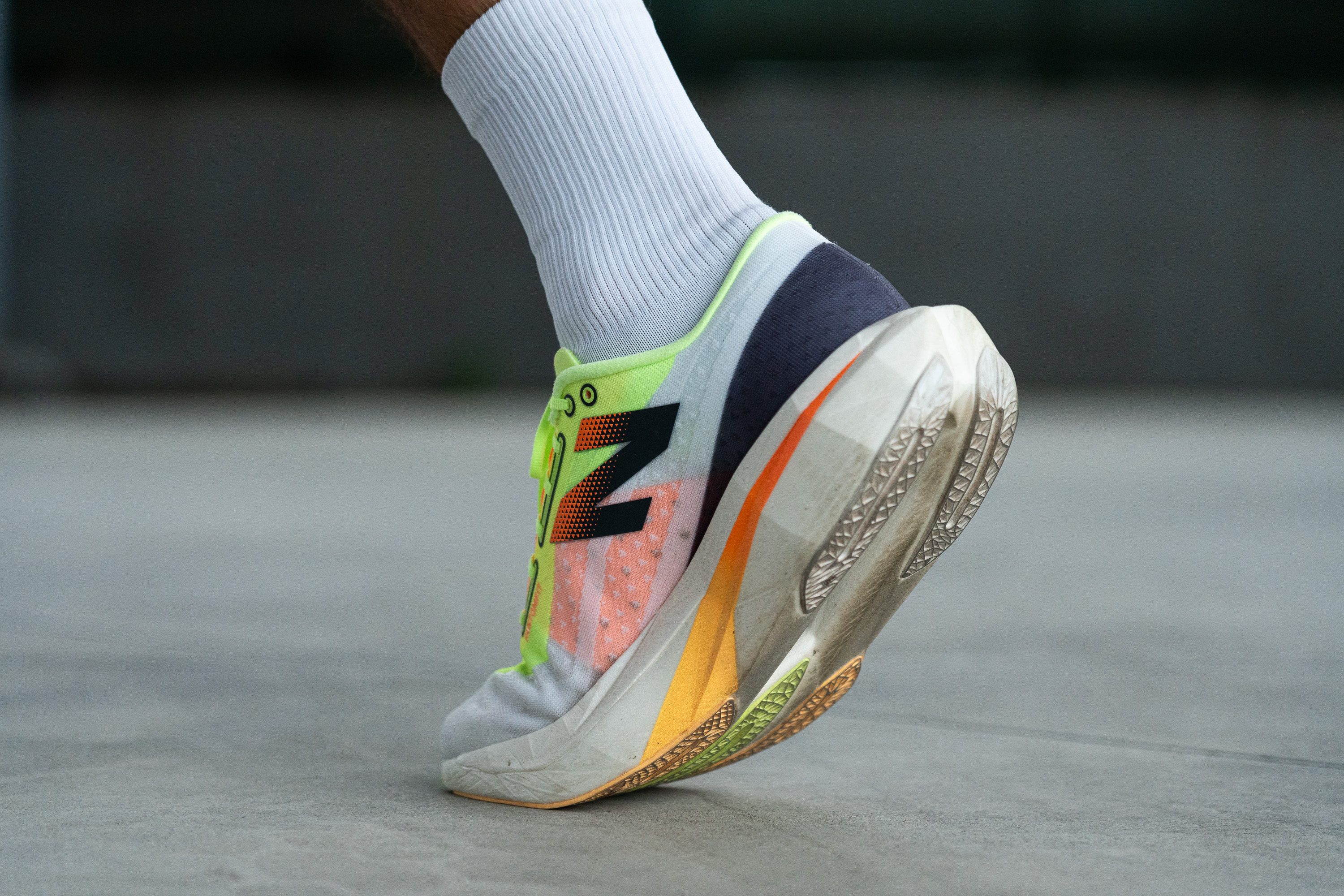
This thickness is reasonable for a racing shoe. However, based on our durability findings, we suggest that New Balance might consider reducing the thickness in the next version to help minimise weight.
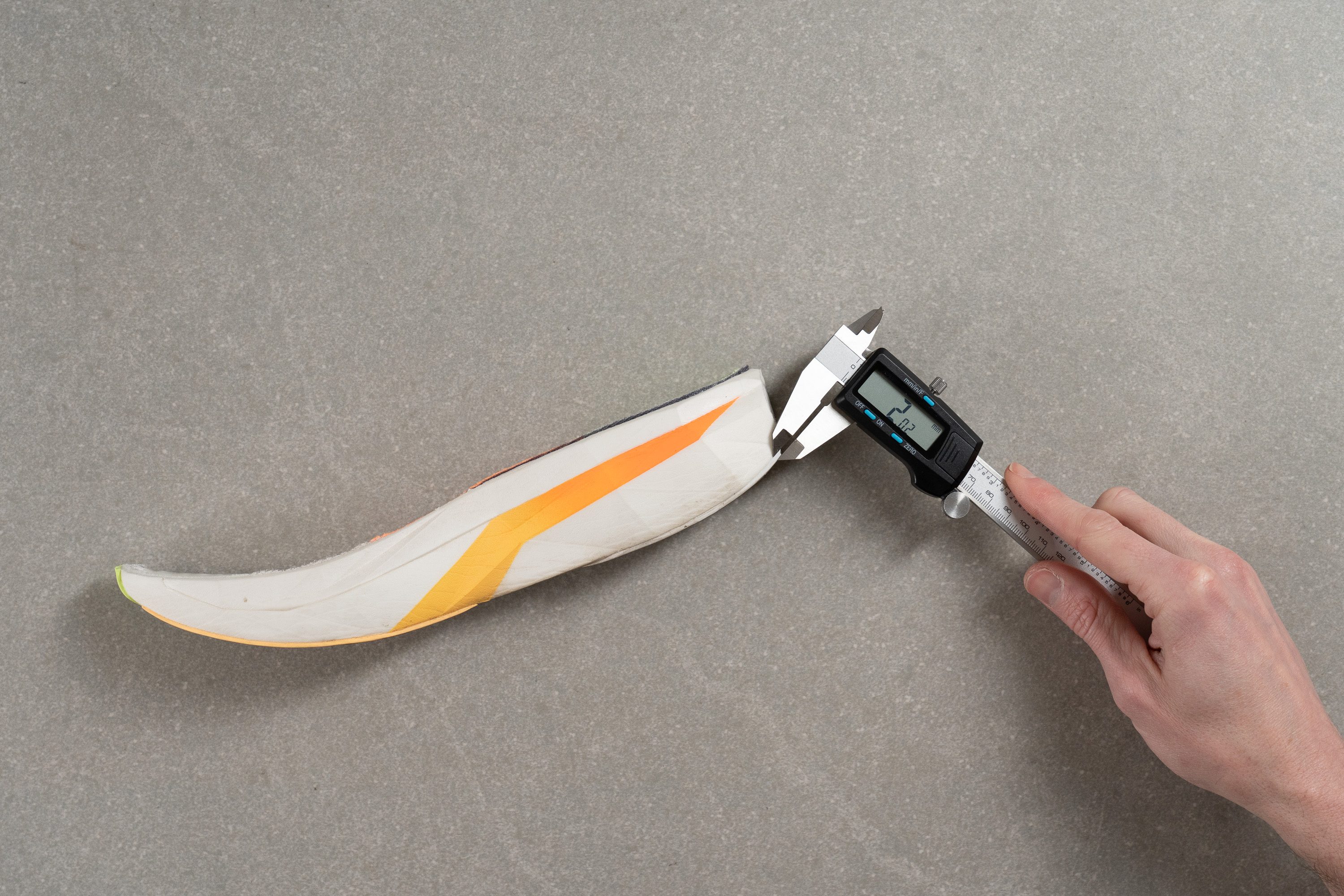
| FuelCell SuperComp Elite v4 | 2.0 mm |
| Average | 3.2 mm |
Misc
Insole thickness
We measured the insole at a remarkably thin 2.6 mm—perfect for a super shoe.
This strategic choice allows for maximising the bouncy foam's potential while keeping the shoe within race-day legal limits. It's a smart move that enhances the shoe's performance without sacrificing compliance.
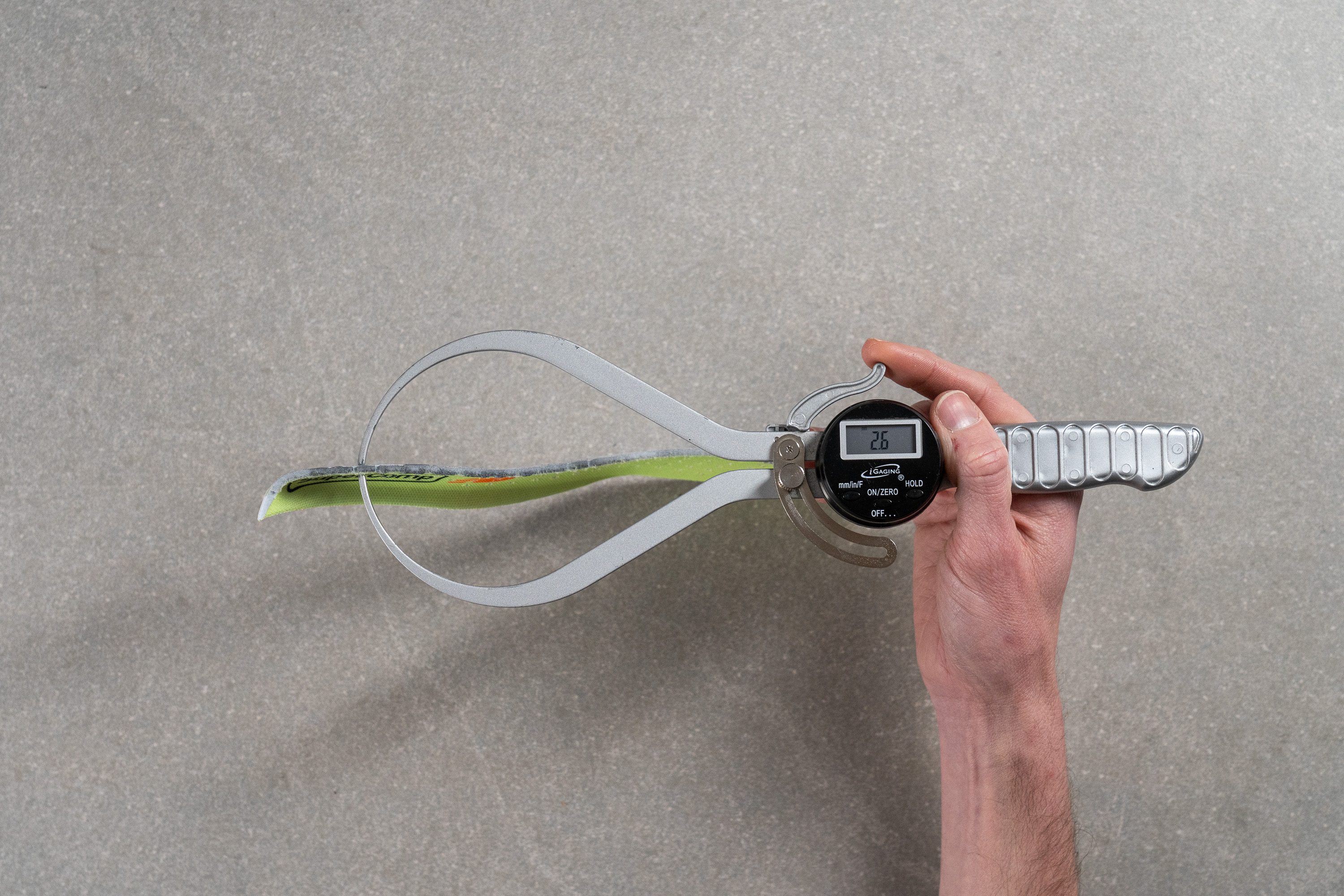
| FuelCell SuperComp Elite v4 | 2.6 mm |
| Average | 4.5 mm |
Removable insole
The insole, perforated and as thin as paper, is not glued down, allowing for easy removal.
This means you can switch it out, but keep in mind its slim profile. Replacing it with a thicker third-party insole could significantly reduce the interior space of the upper.
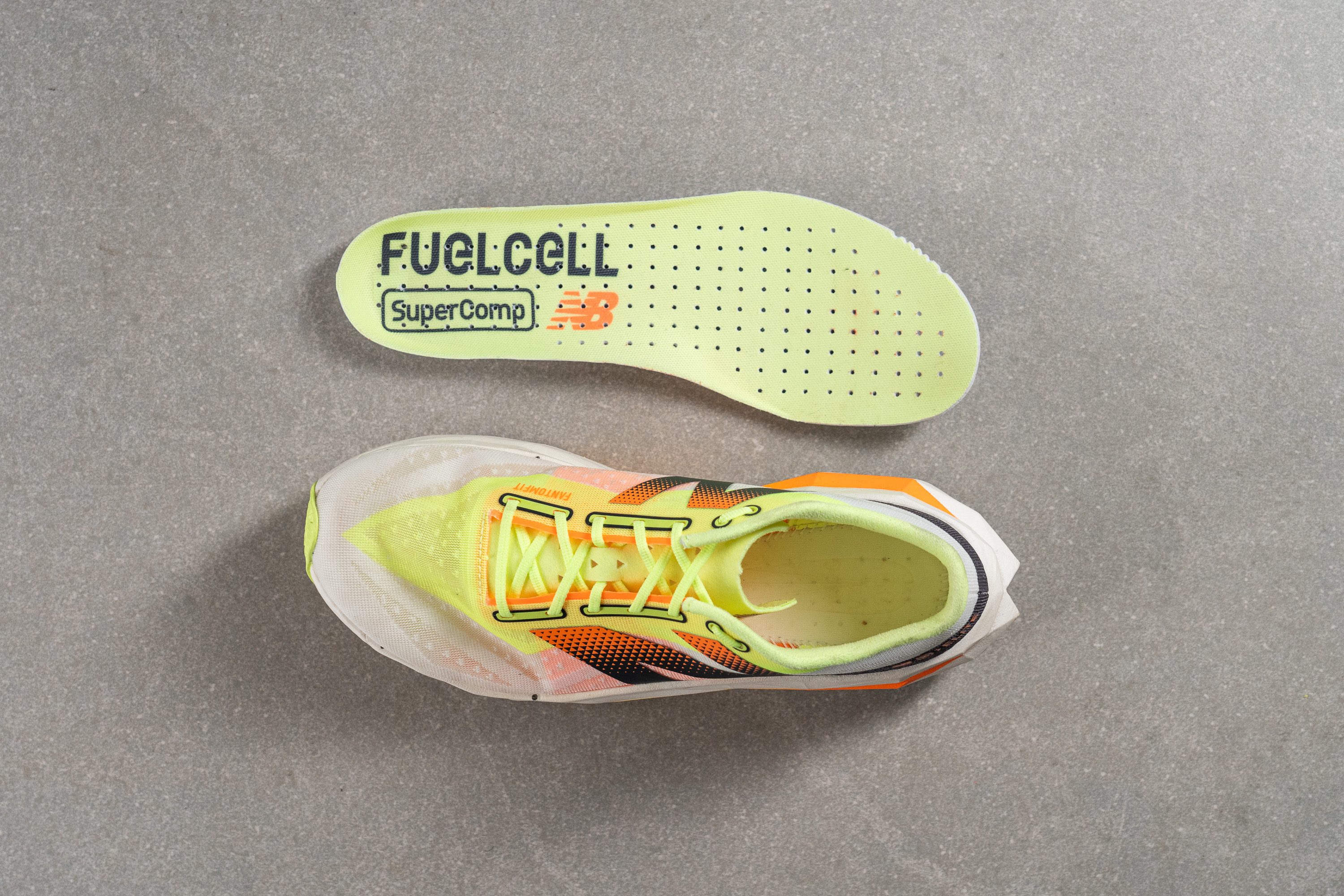
| FuelCell SuperComp Elite v4 | Yes |
Midsole softness in cold (%)
Introducing Pebax foam to the New Balance SC Elite series has been a game-changer—especially in terms of cold-weather performance.
PEBA-based foams, like Pebax, excel in both hot and cold conditions. After chilling for 20 minutes in our freezer, the foam stiffened by only 5.9%, showcasing its outstanding resilience. This result is truly top-notch, ensuring consistent performance no matter the temperature of your next marathon.
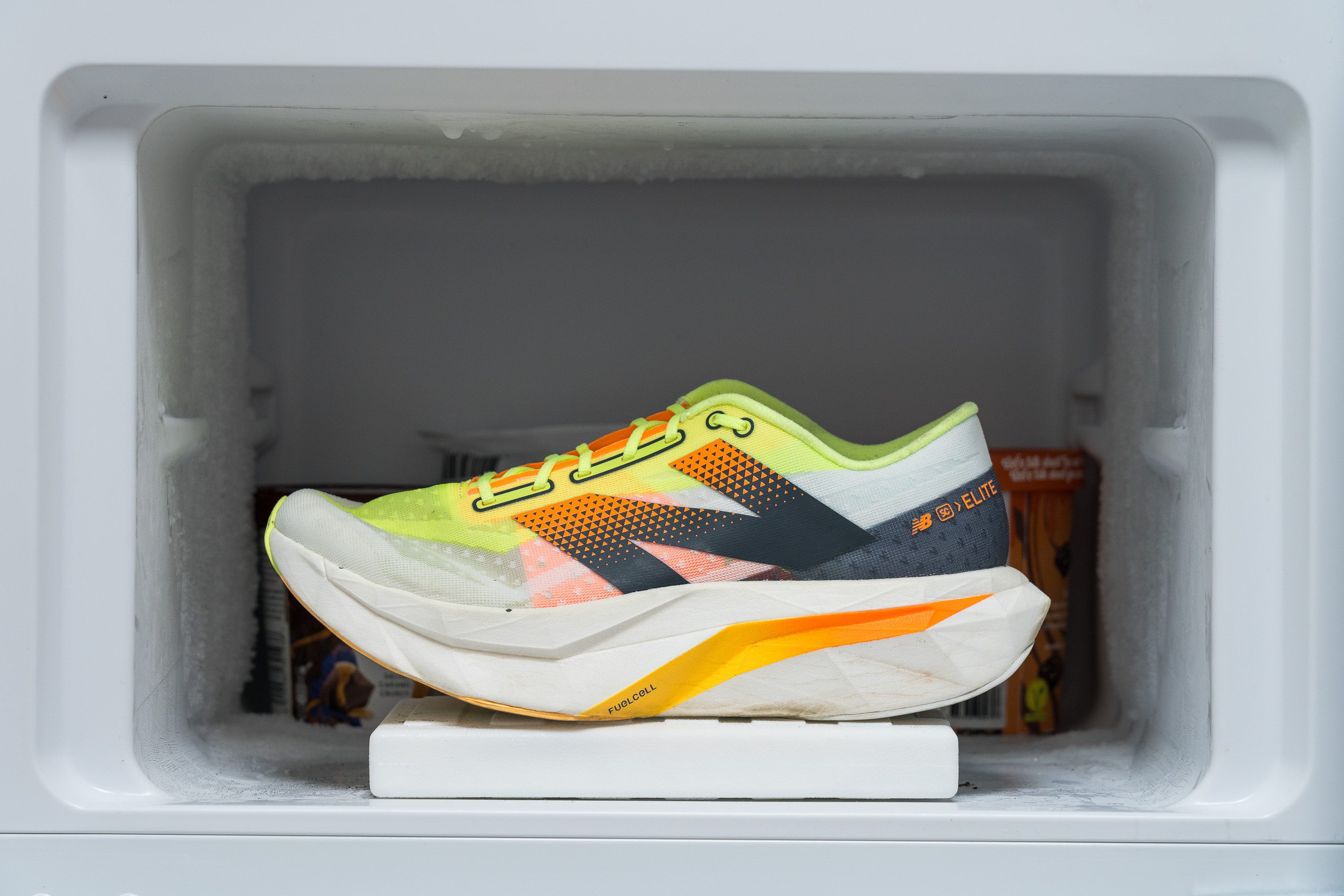
| FuelCell SuperComp Elite v4 | 6% |
| Average | 24% |
Reflective elements
We didn't anticipate finding any reflective elements on the Elite v4, typical for shoes designed for daytime racing, and indeed, we found none.
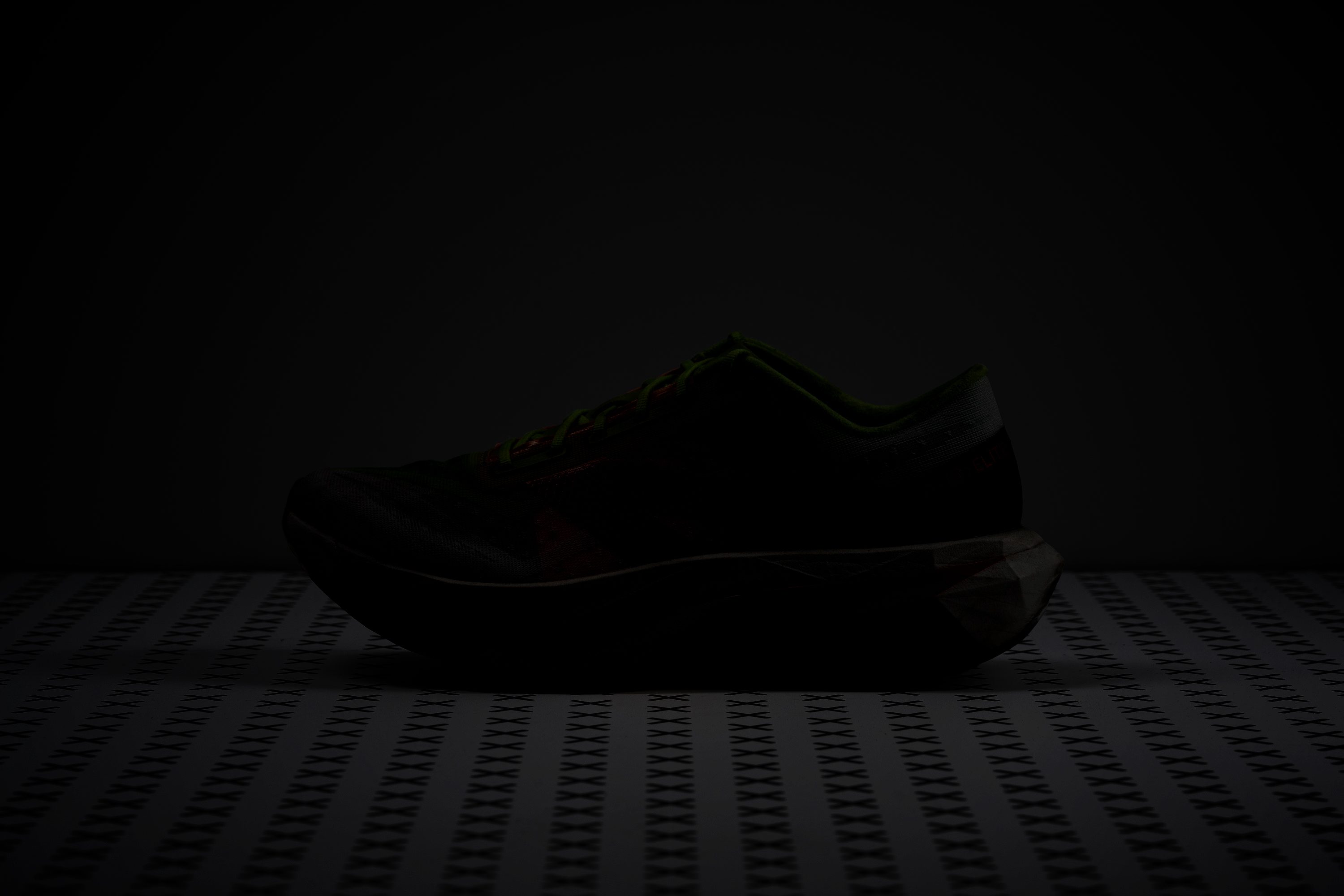
| FuelCell SuperComp Elite v4 | No |
Tongue padding
There's barely any padding, yet it's slightly cushier compared to other super shoes, which often have tongues thinner than 1 mm.
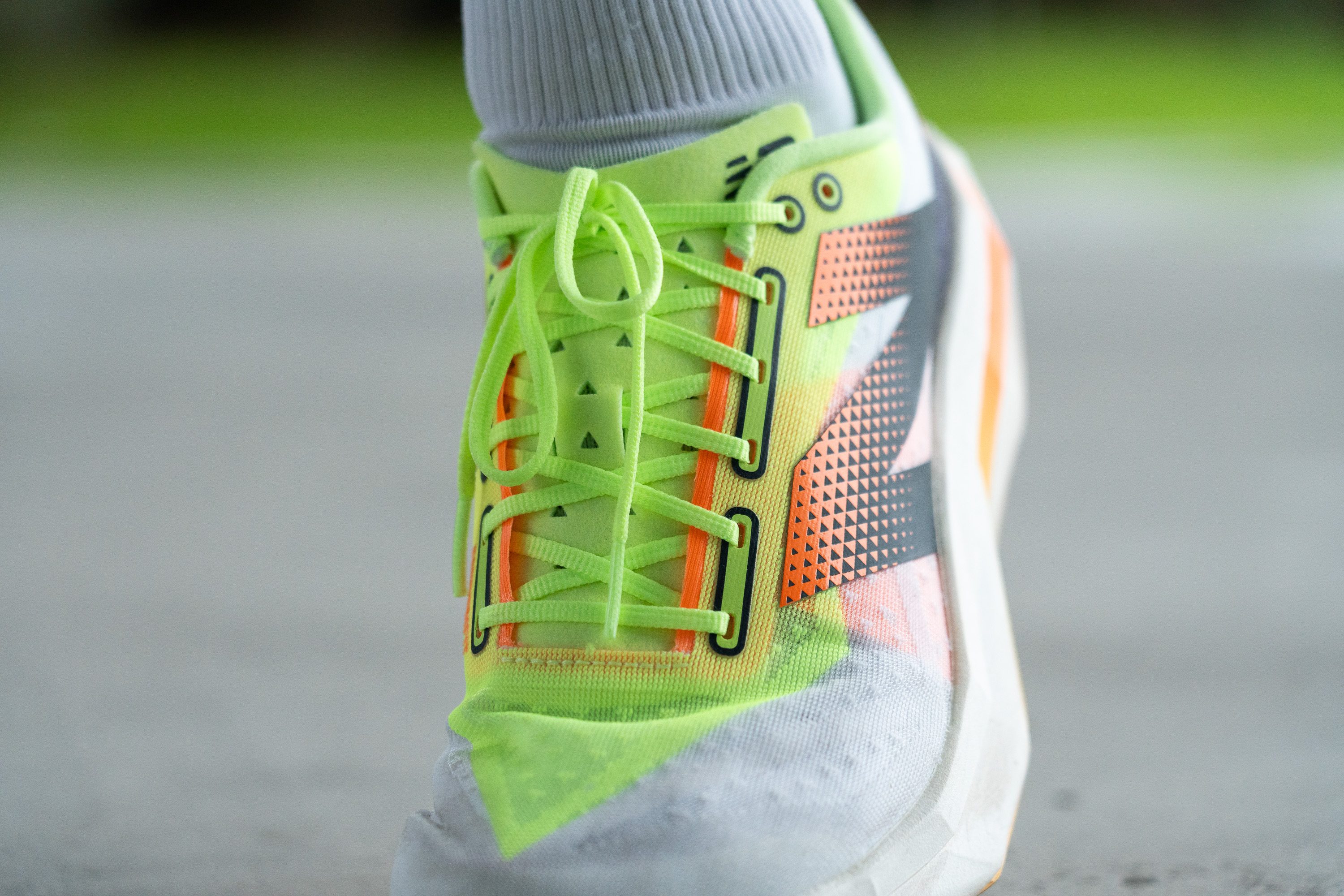
The Elite v4's tongue has a thickness of 1.8 mm.
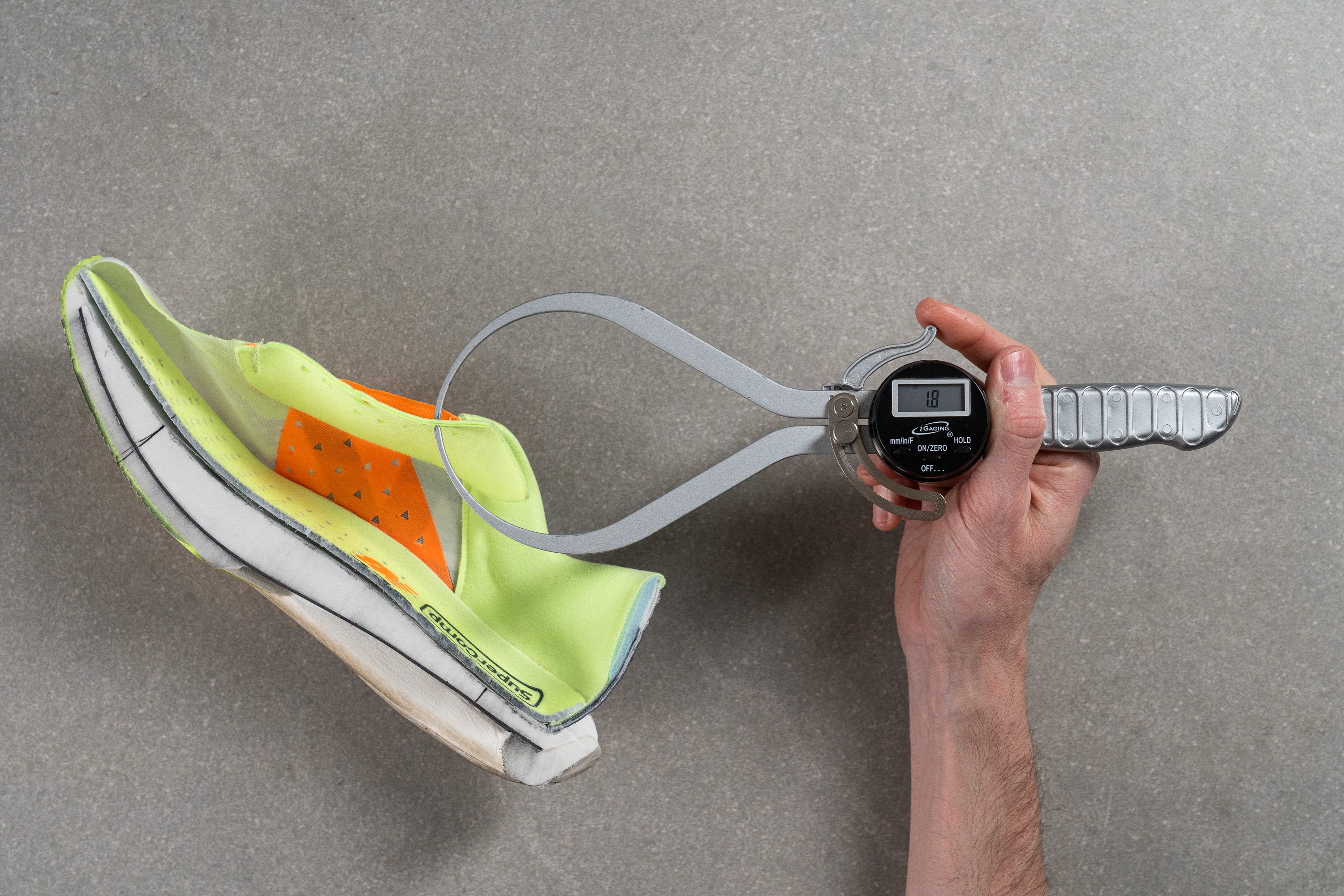
| FuelCell SuperComp Elite v4 | 1.8 mm |
| Average | 5.7 mm |
Tongue: gusset type
We found that the tongue, lacking a gusseted design, at least includes a central loop that somewhat maintains its position. However, during our test runs, it consistently felt a bit short and emerged as a notable drawback. The tongue, in our opinion, is among the shoe's most significant shortcomings.
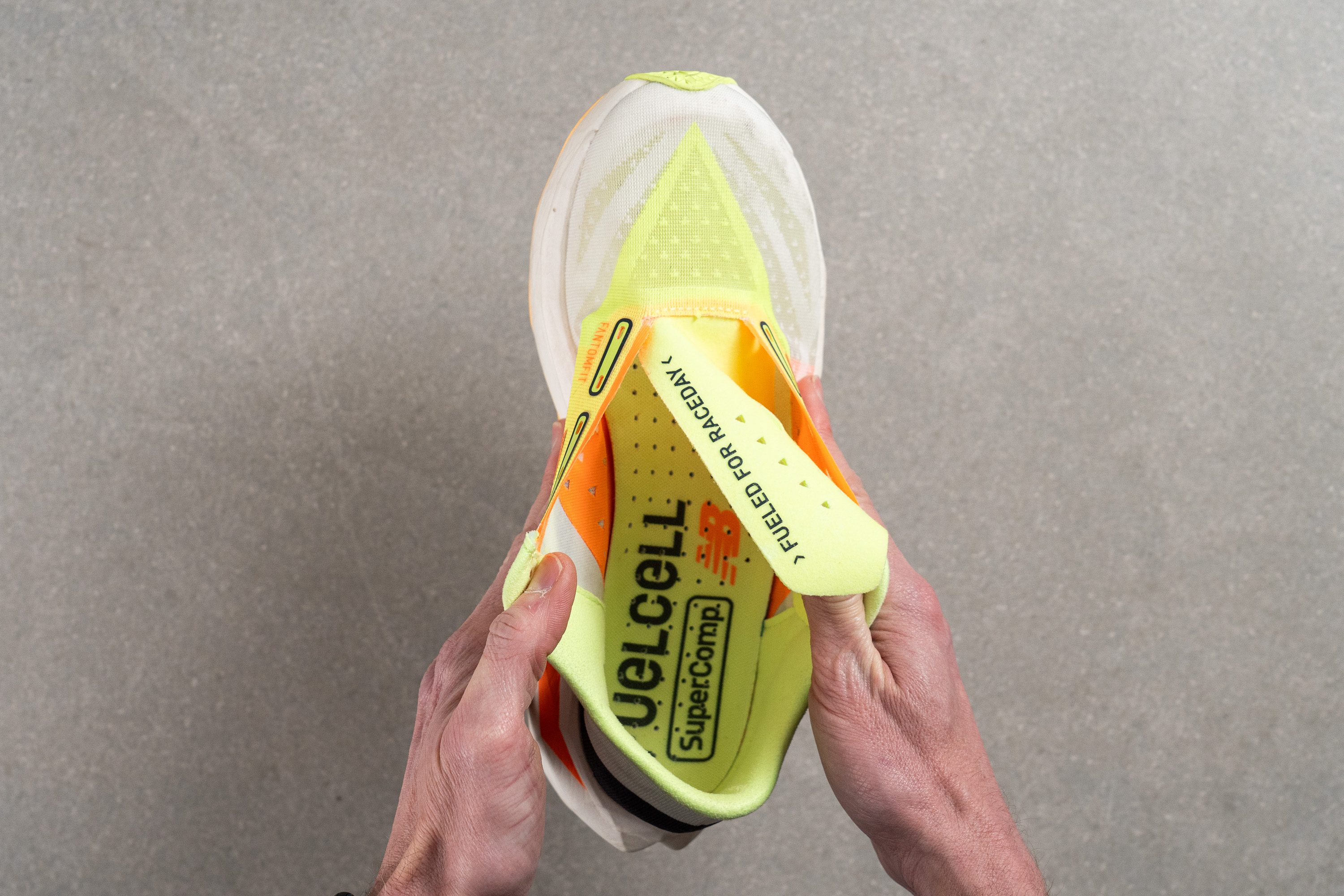
| FuelCell SuperComp Elite v4 | None |
Heel tab
Consistent with New Balance's latest designs, the heel lacks a pull tab, embracing a sleek and uncluttered aesthetic.
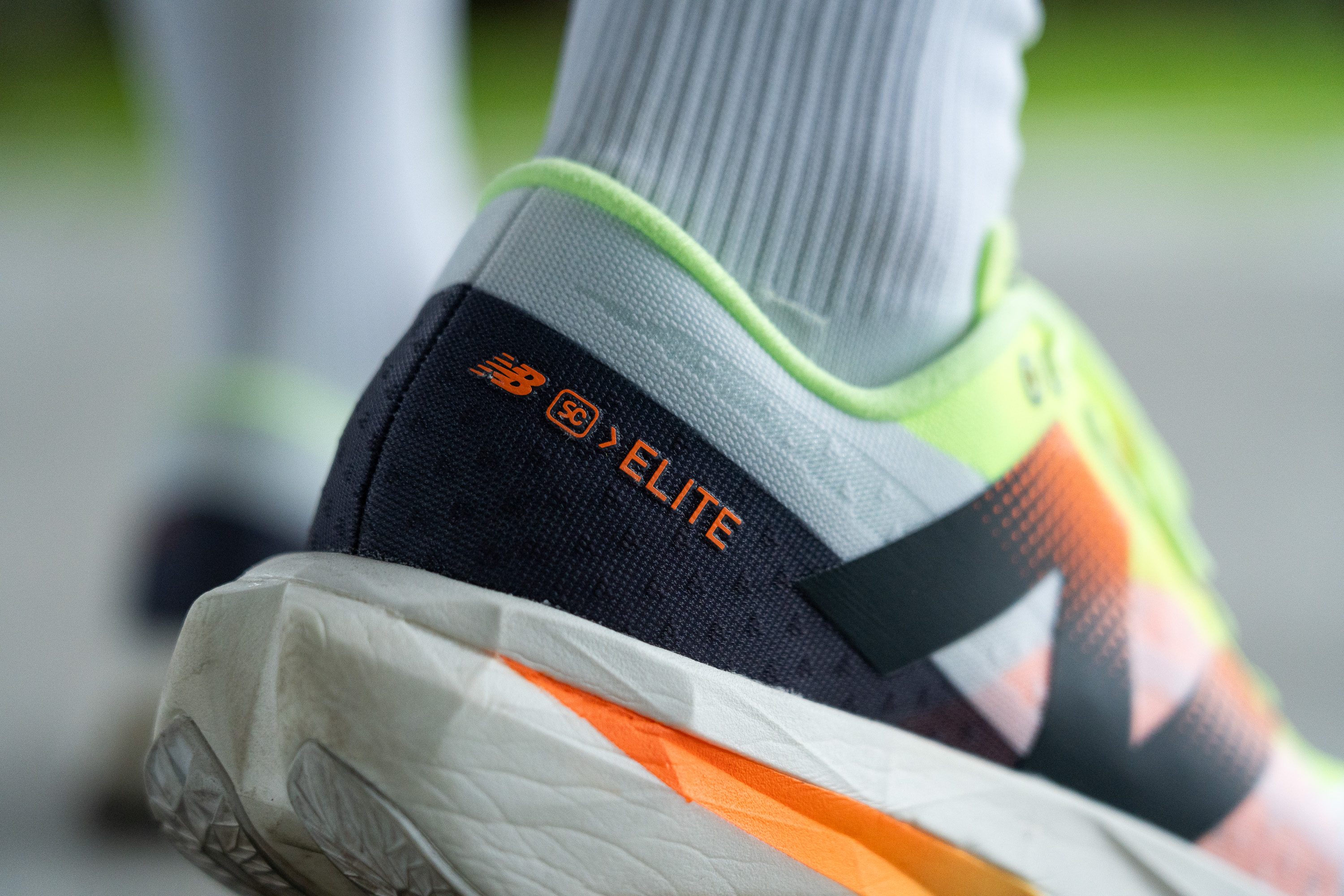
| FuelCell SuperComp Elite v4 | None |

